Ben Franklin Used Fake News
It may seem like our political climate, in which politicians and journalists are accused of inventing phony stories, is unprecedented. Yet there are similarities to past events, and some of the perpetrators of early political chicanery may surprise you.
For example, in 1782, while still representing the United States in Paris, Benjamin Franklin printed a fake edition of an actual Boston newspaper, The Independent Chronicle. Amid the fictitious ads and articles, Franklin inserted a made-up story about the massive slaughter of white settlers on the frontiers of New York. Native Americans, in the service of the British forces, had collected 700 scalps from men, women, children, and even infants, Franklin lied.
When the news reached America, it was reprinted in papers throughout New England. The story helped stiffen American resistance to the British, who were now seen as using Indians to terrorize settlers. Released in Paris, the story also helped sway European opinion against England.
Franklin’s “fake news” was just the start of a long tradition in American politics.
As we noted in “Crude Language on the Campaign Trail,” presidential campaigns have often been marked by fabricated stories and synthetic scandals. Even after the race, the slander often continued.
In 1939, Stephen T. Early, Franklin D. Roosevelt’s secretary, shared several examples of disinformation campaigns directed against the president.
Roosevelt enjoyed broad support among voters, particularly in the early years of his presidency. But he remained a controversial leader for many Americans. Some of his opponents hoped to blacken his reputation with reports of corruption or dishonesty in the White House.
In a file he marked “Below the Belt,” Early gave examples of these fake news stories. Some hinted at sinister, international conspiracies implicating Roosevelt, a foreign-born Supreme Court justice, and labor leaders, among others. One story claimed President Roosevelt had prevented the capture and trial of the true kidnappers of the Lindbergh baby. The kidnappers, it argued, were protected by the president and were still kidnapping and murdering.
Early wondered, as many Americans do today, “just how gullible do these muckrakers think the American people are?”
Roosevelt, however, refused to be baited by these stories. When a publisher reported that the president had fallen into a coma, he offered to print a retraction if the White House issued a denial. All he got was silence. Roosevelt refused to reward him with more media attention.
Unfortunately, in our era of 24-hour information, ignoring even flagrant fake news doesn’t seem to be an option. What and whom are we to believe? In both the literal and figurative sense, we are left to our own devices.
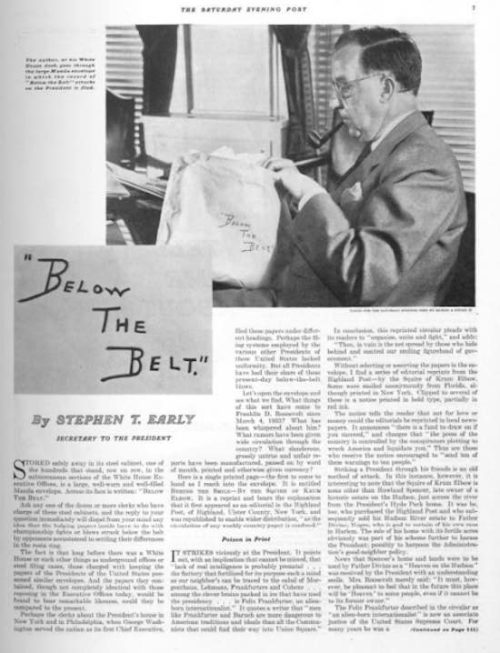
“The Monster and the Infant” by Paul Gallico
Although he is most remembered for his novels The Poseidon Adventure and The Snow Goose, Paul Gallico began his career as a sportswriter for the New York Daily News. Gallico was published in the Post continually throughout the 1940s and ‘50s. His story “The Monster and the Infant,” (1942) about a high-stakes golf championship, showcases Gallico’s folk tale writing style. Above all, he considered himself a storyteller.
Originally published on September 19, 1942
Funny how the mind works, isn’t it? You’ll see something in the papers that brings up memories and, bingo, back you go, living it all over again, as though you were sitting in a movie and seeing it on the screen.
It was just like that when I picked up The Morning Blade the other day and saw that picture on the front page and the story that went with it. It took me back eight or ten years, and presto! there I was on the eighteenth tee at Braewick, for the finals of the National Amateur Championship.
The handsome Infant, chalk-faced from strain and worry, was just setting to hit that life-or-death drive. Behind him, his back turned, a sour look on his big red face, stood the Monster. Down the fairway running between woods to the green stretched ten thousand spectators in an ugly mood.
There were the worried golf officials trying to calm the gallery while state troopers and harried marshals penned them behind ropes. There was that blot on an otherwise beautifully manicured landscape, by the name of J. Sears Hammett. And there was also yours truly, William Fowler, Esq., getting ready as usual to hold that sack.
Brother, it sure took me back, and I can’t say I enjoyed the trip. Because that was one tournament where your Uncle William took it right on the chin.
I know. You’ve heard that one before. And then it goes on to tell how in the end I wind up signing the star golfer for my outfit, A. R. Mallow & Co., makers of Far-Fli Woods, Tru-Distance Irons, and the Thunderbolt golf ball, straighten out the course of true love, and foil the villain, the same being that aforementioned understudy to a cottonmouth, J. Sears Hammett.
Not this one, chum. Maybe it’s time I let you in on one of my lemons.
Remember the finals of the Amateur back at Braewick between Francis Ogden Medford, of the Social Register and Boston’s Back Bay, and Ted Wilson, the high school kid from Lincoln Cross, Iowa? I thought you would. But what you don’t know is that it cost the good name of William Fowler, plus two hundred and fifty pesos in cold cash. For two years after, my best friends wouldn’t speak to me. And I used to be a pretty popular guy before upsetting those frijoles.
Why, I couldn’t even pick up a golf game with the club dubs, I was that shunned. Me, the sassiest advertising-promotion manager in the golf-equipment business, a pariah. And all because if it hadn’t been for my — Well, never mind that now. Let’s get on to the gruesome details.
What was I doing at the Amateur Championship? Just buzzing around to meet old friends, follow the matches, and help out with the lying in the locker room afterward. It was supposed to be a kind of vacation. Some vacation!
Those were still the dear, daffy days when we could run a temperature over a couple of comparative strangers beating a genuine rubber ball cross country with assorted hardware, and our idea of a hero was someone who could tank a putt from thirty feet when the chips were down. And did the country get heated up over young Teddy Wilson!
When the tournament started on Monday morning with the qualifying rounds, nobody had ever heard of Ted Wilson or Lincoln Cross, Iowa. By five o’clock of the same afternoon, that situation had been considerably remedied when he steamed in with a 67-68 for 135, to win the medal by five strokes and break the course record twice. And by Thursday, when he had ripped his way into the quarter-finals by knocking off four of the best amateur golfers in the game, there wasn’t anyone in the U. S. A. and possessions who didn’t know all about Ted Wilson. The newspapers took care of that.
You couldn’t blame them. He was a story. Sixteen years old, with dark, curly hair, apple cheeks, a sensitive kisser coupled to a square fighting chin, and those deep-set gray-green eyes under long lashes that had the hearts of females in the gallery from seven to seventy doing nip-ups, he was Young America. That was Ted Wilson — everybody’s kid, or what everyone hoped his kid would be like someday.
He was as poor as a church mouse’s second cousin, and supported his widowed mother in Lincoln Cross, Iowa, caddying, and doing odd jobs after school. I’m only refreshing your memory, since you read it all in the newspapers at the time: How he got to the tournament by hitchhiking across the country, sleeping in barns on the way, and arriving at Braewick with a canvas sack of rusty clubs, eleven dollars, and two clean shirts.
He got a room for two bucks a week about five miles from Braewick, and walked to and from the golf course every day. He lived on hamburgers and milk, and wouldn’t take a gift or a handout from anybody. Every night he washed out his shirts and ironed them in the morning before going to the club. Wow! Did the sob sisters go to town on him!
And those clubs of his! No two alike; they were patched, taped, warped, and held together with wire. He’d never had a new ball in his life, and used twenty-five-cent repaints. He played in sneakers because he couldn’t afford spikes. He would have carried his own bag if they had let him, but the day after he got there, old Pete the Grouch, assistant caddiemaster of Braewick, took his bag for nothing. He was that kind of a kid. Everybody fell in love with him.
And golf? Brother! It was just like the days when Bob Jones first popped over the horizon. From the first moment I saw that beautiful swing I followed him around in a kind of daze, hoping that maybe if I watched him long enough, some of his golf might come off on me. The first three days of that tournament were just like a beautiful dream for your Uncle William. Fun, no worries, and supergolf.
And then, blooie went the dream!
It went up with a loud bang when The Blade came out Thursday morning, the day of the quarter- finals, carrying an interview with Ted by Una Odell, one of the damper sob sisters. I still have the clippings, and I quote:
I asked him whether he intended to go to college when he finished high school.
“Gee, Miss Odell,” he said, and his wonderful deep gray eyes turned serious for a moment, “I’d like to go to college, but I can’t. We’re too poor. If I win the championship I’m going to turn professional right away and get a job, if I can. Golly, Miss Odell, I’ve just got to win it.” And here a look of tragic sadness came over his handsome young face, and his childlike mouth quivered a little. “We haven’t been able to pay the interest on the mortgage since dad died, and we’ll lose the house if I can’t make some money. But if I win the title, maybe I can get a good job with some club, and…”
Maybe! That was just putting it mildly. The facts in Una’s bilge were straight. The balloon went up shortly after. There were three telegrams on my plate when I came down to breakfast that morning:
IF WILSON WINS DO NOT FAIL TO SIGN FOR A.R. MALLOW & CO. STAFF. WORTH THOUSANDS IN PUBLICITY TO US. A.R. MALLOW, PRESIDENT.
EXERT ALL INFLUENCE OFFER EVERY ASSISTANCE TED WILSON WIN CHAMPIONSHIP MAKE ANY OFFER WITHIN REASON. ADVISE AND HELP HIM, INSTILLING FEELING OF GRATITUDE TOWARDS OUR COMPANY. WHOLE COUNTRY TALKING ABOUT HIM. IMPERATIVE YOU SIGN HIM IF HE WINS. WILL PAY SALARY AND BONUS ALSO MORTGAGE ON HOUSE. STRONGLY URGE YOU LEAVE NO STONE UNTURNED. WE ARE PREPARING ADVERTISING CAMPAIGN BASED ON WILSON. GO TO IT. A.R. MALLOW, PRESIDENT.
RE MY FIRST TWO WIRES. DON’T FAIL. MALLOW.
That was the Old Man for you. What he didn’t know about golf tournaments, if laid end to end, would reach from here to California. “See that he wins.” Huh! The Amateur Championship! What was I supposed to do, slip Mickeys into the soup of his opponents, or jog their elbows when they went to putt?
I tucked away a double of ham and eggs and coffee to give me strength and went out to try to tie an option on the kid in case he should come through. I found him finally off in a corner of the locker room, surrounded by the one guy in the world who can give the itch to poison ivy, J. Sears Hammett, advertising-promotion manager of the Fairgreen Company, our biggest rivals in the golf-equipment manufacturing field.
He had the youngster pinned up against a locker and was giving him that codfish eye and grade-B clabber smile. Before I could get in a word, he said, with that nasty, horse-cough laugh of his, “Ha-argh, ha-arrgh! If it isn’t my old friend, Bill Fowler, late again as usual. I’ve just finished telling my young friend here what Fairgreen is going to do for him. Too bad about you, Fowler. Asleep at the switch. Ha-argh! He’s practically signed with me, haven’t you, Teddy? Ah, what happy times we have over at Fairgreen.”
The kid blushed under the fuzz on his cheeks and stammered, “Well, gee, sir, I — I didn’t exactly. I mean — ”
I could see right away that Hammett was bluffing, but the kid was too decent and well-mannered to show him up in front of me.
Hammett waved a finger at him. “Ah-ah! Now, Teddy. I shall hold you to your word. Remember what I promised you.”
“Oh, boloney,” I said. “I don’t know what he promised you, Ted, but Mallow wants you if you win this thing and we’re prepared to double any offer this man made you right now, and what’s more — ”
“Gee, sir,” Wilson began, “that’s wonderful, but — ”
Hammett began to wave his arms and howl. “Don’t you listen to him, Teddy. You admit I spoke to you first. That’s as good as a contract. We’ll — ”
“Hammett, you’re a cockeyed — ” was the best I could come up with, when Ted extricated himself from the corner, saying: “Say, look, you’re both very kind, but I can’t sign with anybody until I win and the tournament’s over, or I’ll get in Dutch with my amateur standing. I just can’t. I have to go out and play golf now. I’ll see you both later. G’by.” And he ran down the aisle of the locker room and out the door.
I said to Hammett, “You’re a fine lug, trying to bully a sweet kid like that.”
“Ha-arrrgh! I suppose you think you’re going to get him.”
“You can just bet we’re going to get him.”
“Ahem. I take it you would wager on it.”
“Ya-a-as. I wanna bet. Make it easy on yourself.”
“I don’t bother with chicken feed, Fowler. Care to risk two hundred and fifty?”
“You’ve got a bet.”
“Okay, Mr. Sucker. Two hundred and fifty you don’t sign Teddy Wilson. Be seeing you out on the golf course. So long, sap!”
I guess I’ve told you there’s something about J. Sears Hammett that puts me right off my chump. When I’m face to face with that patent leather louse, getting that buck-tooth sneer out from under those six bristles he wears for a mustache, my brain addles like an egg dropped into a concrete mixer.
And this was no exception. Two minutes after he had gone out, I was still standing there banging myself on the brain box with the heel of my hand, and moaning: “Stung! Stung again!”
I had just realized what Hammett had put over. Like a copper-riveted, triple butt-welded boob, I had bet two hundred and fifty of my hard-earned piastres that we would sign up Wilson. And he hadn’t even won the tournament yet. He still had his two toughest matches to play. If he lost, nobody would sign him. I had given Hammett even money on a five-to-one shot, because even if he came through, I still had to put the deal over with him. That’s Fowler.
Maybe you think it was too early in the morning to start inhaling tall ones, but brother, I needed a couple. Of all the prize clowns, yours truly topped the bill. After the medicine had taken hold I went out to look at the bracketing on the scoreboard to see what my chances were of Ted Wilson winding up with the championship. It didn’t take much of a look, either. It was sure to be Ted Wilson against the Monster in the finals.
Of course you may not know him by that name, but just as the sports writers nicknamed Wilson the Infant, they hung the tag of the Monster onto Francis Ogden Medford, millionaire bachelor, socialite, blueblood amateur sportsman from Boston’s Back Bay. Nobody liked Mister Social Register Medford.
Most of my information on Medford came from the sports writers, whom he avoided and invariably refused interviews. They pegged him as a platinum-plated snob and stuffed shirt. And just hanging around the tournament, I could make out that he wasn’t exactly an ideal companion on a golf course.
He was as hard as nails, and a pretty tough customer, I guess, because he piloted a Spad in France in the last war. You had to hand him that.
At the start of a match he never more than nodded to an opponent. He shook hands at the finish, and if anybody got more than a grunt out of him at any other time during a round, it was scored as a double eagle. But I never saw a guy concentrate more on the game. His application was terrific. He played like a machine, and he played all out to win, which is all right in my book, except that I like to think of golf as a kind of sociable game.
But not Brother Medford. He didn’t seem to have any friends around the clubhouse, and as soon as it was over he would climb into his sixteen-cylinder chariot, piloted by a couple of Senegambians in livery, and buzz off to parts unknown. I told you he had a hot golf game, didn’t I? He’d been runner-up several times in previous amateur championships.
I was asleep at the switch again, and J. Sears Hammett snagged the Infant at noon recess and bought him lunch. I passed them on the terrace and Hammett was filling the kid full of chicken salad, ice cream, cake and lemonade. As I went by, J. Sears gave me that triple-fang smile which meant that he was feeling cocky, and said, “Haw-haw, Fowler. Sorry I can’t ask you to join us, but there’s no room. Anyway, Teddy and I want to talk over his contract with Fairgreen. So long, old boy, and never mind the check when you pay off. I’ll take cash. Haw-haw!”
I had one of my pure strokes of genius when I saw what he was feeding the kid, and went to the locker room shop and bought a box of indigestion tablets. It was a good thing I did, too, because halfway around in the afternoon the Infant got sick as two pups and blew four holes in a row, going three down to the Canadian champion. I went up to him and slipped him a couple of tablets. He felt better right away and began to pick up again.
He said, “I’m mighty grateful to you, sir. I don’t know what I’d have done if you hadn’t come along.”
Maybe you think that didn’t make me feel good. I stuck with the boy the rest of the round and did what I could to help him out by keeping too-enthusiastic galleryites and sob sisters off his neck. He just squeaked through with a birdie on the eighteenth to go into the finals the next day.
Fellow students, do you remember the papers that Saturday morning when Francis Ogden Medford, of Boston, and Ted Wilson, of Lincoln Cross, Iowa, met for the amateur championship? They pulled out all the stops, didn’t they? Without actually calling Medford a safecracker and second-story man, they made it clear that the forthcoming battle for the Amateur Golf Championship was the final and decisive struggle between wealth and poverty, freedom and tyranny, Good against Evil.
Of course, you couldn’t blame the press entirely. The contrast was right there before your eyes: Medford equipped with the best that money could buy — forty-dollar shoes, sharkskin slacks and Irish linen shirt, as immaculately groomed as a wealthy man can be. His personal African toted a tooled-leather sack of mallets that had been handmade and designed especially for him, each one a masterpiece of matching and balancing; he played the best and fastest ball on the market, each one neatly stamped with his initials, F.O.M.
And there, on the other hand, was the Infant, in sneakers, khaki pants and cotton shirt, with a torn canvas bag of miscellaneous warped, mismated hardware, and a handful of cheap, repaint golf balls that wouldn’t go over two hundred and thirty yards if you fired them out of a trench mortar. The papers didn’t miss any of that either.
The last time the country got as steamed up over who was going to win a big sports event was when Helen Wills played Suzanne Lenglen. Only this one was going on right under our noses, where the folks could get out and hiss the villain.
They did too. In the key of F. By the time the Infant and the Monster had finished the morning round of eighteen all square and had called a truce to take aboard some groceries, that golf match was a shambles and the unhappy officials had sent out a hurry call to the state troopers and fly cops to come over to the golf course and maintain law and order for the last holes that would decide the championship.
I can give you a picture of it in one line. Not even the gamblers were rooting for Medford.
Wilson and Medford played ding-dong golf in that morning round, but the gallery was brutal. There were nearly ten thousand of them out there, and they believed all the stuff they had read in the papers. Besides, they were seeing it with their own eyes: Medford, surly, taciturn, big and beefy, tough, conceding nothing, applying the rules and making them stick, never so much as by a smile or a gesture acknowledging anything the Infant did, while Ted battled on valiantly, the perfect little sportsman, applauding Medford’s good shots, and there were plenty, and conceding putts as much as a foot away from the hole. The Monster conceded nothing. He made Ted putt them out from two inches away. When we got onto that first tee after lunch for the final round, that gallery was loaded for Siberian bear.
Hammett and I were following the match together. He wasn’t exactly the kind of companion I would pick unless I were locked in the cooler with him, but we both had the same objective, which was to root that kid through.
Then the series of stymies happened. The Monster laid the Infant three stymies in four holes, and won them all. Of course it was only a coincidence, because anyone who knows anything about golf can tell you that if a man can putt well enough to lay three dead stymies he can also putt well enough to drop them into the can, which is a lot more conclusive. But that wild-eyed mob booed and hooted and yelled.
Hammett was trying to show off to the Infant by shouting with the rest: “Make him stop that! Bad sport! For shame!” to the kid’s distress. The behavior of the gallery toward his opponent was upsetting him.
I said to Hammett, “Oh, shut up, and don’t be an ass! You’re making Ted nervous. This isn’ t a prize fight. It’s supposed to be amateur golf.”
“Amateur golf, my eye,” said Hammett nastily. “It’s business, and I’m protecting my client. Of course, if you want to pull for Medford — ”
What was the use?
Ted was one down on No. 9 and lay on the green with a chance for a half, The Infant addressed his ball to putt, when he suddenly straightened up and stepped back.
“I’ve got to call a stroke on myself,” he said. “I moved the ball more than half a turn.” Nobody had seen it happen but the Infant himself.
Hammett was livid. “The young idiot,” he stormed. “He could have got away with it. We’ll soon cure him of tricks like that at Fairgreen.”
I was sick to see Ted lose that stroke and the hole, too, but, doggone it, I was proud of him! That’s golf. If you start out by not cheating yourself, you’ll never cheat anybody else.
Out of the silence that fell over the crowd as they realized what the boy had done, came a man’s voice.
“I’ll bet the Monster’s going to take it, too, the big bum.”
Of course they didn’t know that Medford had no choice in the matter. But the Monster didn’t make matters any better by failing even to acknowledge the kid’s fine gesture. He simply picked up his ball, turned his back, and walked off to the next tee.
That angry gallery really got articulate. “Boo-o-o! Why, he didn’t even say thank you! Oh, you big fat snob!” You could tell they’d been reading those newspaper stories. A woman threatened Medford with her parasol and screamed, “Aren’t you ashamed of picking on a fine boy like that?”
After that, some of the coppers and marshals formed a ring around Medford and the match got on a little faster. The Infant really began to pour on the golf, pulled up even, and went one up on the Monster at the sixteenth, when he tanked a thirty-footer for a bird and the crowd went nuts.
I was beginning to figure already how I would get his name on the dotted line for A.R. Mallow & Co., when he ran into a piece of tough luck on the dog-leg seventeenth. He tried to carry the corner of some houses with that cheap ball, and pulled a little. The fore caddie didn’t see it fall, and the ball was lost.
It was lost, too, because ten thousand people tried to find it. You never saw such a trampling as that landscape caught. I saw the Monster glance at his wrist watch and say something to the referee, who nodded, immediately called time, and ordered the Infant to play another ball, which of course he did, a nice spanking shot, which, however, wasn’t going to do him much good.
When word got around the gallery that Medford had notified the officials that the five minutes allowed under the rules to find a lost ball had expired, that mob really began to boil. I had never seen cops on a golf course at a championship match before, but, believe me, comrades, I was glad to see them now. They did a lot of circulating around and the sight of the uniforms cooled the populace off a bit. Still, that didn’t help our side. Ted lost the hole and the two men walked up to the eighteenth tee all square.
That eighteenth was a sight too. The fairway was lined solidly on both sides with people, and they were banked twenty deep around the green, four hundred yards away. And you couldn’t hear a sound as the Monster stepped up to drive.
Strangely, this time, the gallery didn’t make any noise or try to rattle him. I guess the drama of the match had got them. But, boy, you could just feel it. Ten thousand souls concentrated on hating one man and wishing him into trouble.
They got their wish too. The Monster made the only bad shot of his entire round. He hit a whistling hook that curved for the thick woods on the left. The crowd scattered in all directions to let it go in, running right over the fore caddies posted there. And that ball went bye-bye too.
Then the Infant teed up his ball. Even before I heard the yell of delight from the partisans, I knew from the clean “snick” that it was a honey. It was low, hard and perfectly placed. It left him with an easy mashie shot to the island green.
The Monster strode down the fairway, headed for the rough. You’d have thought there was poison oak, smallpox and mustard gas in that woods the way the crowd kept away from the spot where the ball might be. The only ones looking for it were the caddies, officials, Medford, and young Ted. But the citizens had plenty to say.
“There, how do you like some of your own medicine now? . . . Hope you don’t find it… Hey, kid, let him find it himself, if he can… Two minutes! Two minutes!”
Somebody had made note of the time the search began and the spectators took up the chant: “Two and a half minutes! Three minutes… Three and a half!”
There was a lot of tangled underbrush at that particular spot in the woods. Hammett and I walked past it through the edge of the rough on our way to the green just as the crowd let out a joyous roar of “Four minutes!”
One more minute, and the kid was in. With that position, he was a sure thing to get a four to Medford’s five. Some of the color had come back into his face, as the seconds ticked off. Well, you couldn’t blame him. It was the luck of the game. He had taken it on the chin at the last hole. Now it was his turn to get a break when he most needed it.
The mob chanted, “Four and a half minutes.” The kid’s face was working. He was trying so hard not to look happy about it. The Monster was preparing to go back to the tee and drive another.
And that was when I saw the ball.
It was buried almost out of sight in a tuft of thick grass in the rough in a wide space between trees that gave a difficult but clear shot to the green. It hadn’t been found because no one had seen it hit a tree and bounce back.
Hammett saw me goggle and stare and spotted it at the same time. It was the Monster’s ball, all right, because down through the grass we could see the red stamped initials, F.O.M.
Hammett grabbed me by the arm hard. “Hah!” he whispered. “By gad! Teddy’s won. They’ll never see it there.”
I guess I was just the biggest fool in the world that day. But, you know, golf is a funny game. You either love it or you don’t. And if you do love it you like to see it played the way it’s written.
I knew it was only a matter of seconds before time would be called, but I certainly managed to think about a lot of things while they ticked off. Sure, I knew all about Medford and his money and social position, and that it was just a cup he was playing for, maybe to bolster his own ego. And I remembered Ted, too, and how much he needed that victory, and what it would mean to lose. I even had time to toss a thought at my bet with Hammett and the value it would be to Mallow & Co., in publicity, to snag the Infant.
But, dammit, they were playing for the amateur championship of the United States, and that’s more than just a bunch of words. It was an honor to hold it. And no matter what kind of a slob he might be, as long as he stuck to the rules and played the game, Francis Ogden Medford was just as much entitled to a fair chance to win it if he could as Teddy Wilson.
Anyway, we’d all gone cockeyed on that newspaper publicity. What did I really know about Medford? Bob Jones used to play with that sick expression around his mouth, and it was nothing but just plain nerves. Maybe Medford was a snob, but that was his business, too, though I’ve seen a lot of shy men accused of the same thing. And he was no more responsible for the position into which he was born than as Ted. He had taken an awful horsing around from that gallery without a single beef.
But the point I couldn’t get away from was that those two weren’t out there to see whether Ted Wilson could get a job as a professional and lift the mortgage on the old homestead, or Medford add another pot to his collection. They were there to settle who was the best amateur golfer in the country that day.
Yes. You guessed it. I did the sappy thing. I yanked away from Hammett, raised my arm, and shouted, “Found!”
Just in time, too, because already the crowd was beginning to chant, “Five minutes! Yah, yah, Medford.”
The Infant turned as white as his shirt. Gee, I felt rotten. Medford didn’t even say, “Thank you.” He just walked up to the ball in a kind of daze and began studying the lie. After a while he pulled out a No. 3 iron, whaled with all the power of his burly body, and spanked it out of there and up onto the green a foot from the cup.
My pal, J. Sears Hammett, sure was a help at that moment. He ran up to the Infant, pointing at me and screaming, “He did it! There’s the man who did it! That’s your fine friend. I told him to keep quiet. That’s the kind of a deal you’ll get from that Mallow outfit!”
The kid, with a tired and kind of sick look on his face, just said, “Oh, please, leave me alone,” and walked away.
He still had plenty of guts. He went up to his ball and hit a good shot up to the green, but it wasn’t good enough. He took two putts to the Monster’s one, and that was that. Francis Ogden Medford was the new amateur champion.
There was only a bare handful of people stayed around for the cup presentation ceremonies. And for just a moment, when Medford accepted the trophy, that curdled expression left his face and he smiled like a human being. He turned to the Infant, stuck out his hand, and said: “You played a fine game. Thank you.”
The kid grinned like a sportsman and replied: “Thank you, sir. I enjoyed playing with you. I learned a lot.”
Medford smiled again, and patted Ted’s shoulder awkwardly. His big beefy face was redder than ever. If it hadn’t been Medford, I’d have sworn he was blushing.
I wired Mallow and asked to be allowed to sign the boy anyway, because he was such a comer, and stuck around the wire tent until the answer snapped back:
R. MALLOW & CO. NOT INTERESTED IN RUNNERS-UP. FEEL YOU HAVE FALLEN DOWN ON THE JOB. A. R. MALLOW.
And so that tournament melted away into the litter of torn programs, sandwich wrappers, squashed drinking cups and paper admission badges. I told you it was one of my lemons, didn’t I?
That’s how it ended. Except that as I stood waiting for a cab to get back to town, Francis Ogden Medford’s thirty thousand-dollar special Mercedes Hispano Snoozer went growling down the gravel driveway. There was somebody sitting next to the Monster for a change. I got only a flash of him as the car went by, and for a moment I thought it looked like the Infant. But of course it couldn’t have been.
The golf world never heard of the kid any more. It was too bad, but it often happens that way. They zoom up out of the unknown like skyrockets, take a licking, and that’s the end of them.
So that’s why I got such a kick out of that picture in the newspaper I started telling you about. It was a photograph taken in Washington recently, and showed Brig. Gen. F.O. Medford pinning the Distinguished Flying Cross to the chest of Capt. Ted Wilson of the U. S. Army Air Force for his share in dropping steel posies on Hirohito on the occasion of that little social call the boys made over Tokyo.
The Infant was taller and older, but he seemed just the same — a fine, wonderful kid, but the Monster, as he gazed at him and the medal he had just given him, looked as though he would bust right out of his uniform with pride. You would have thought you were looking at father and son.
Well, in a way, you were. There was a yarn went with the picture. A reporter had dug up the story of how Medford and Wilson had once met for the amateur golf championship and the way the match had ended. But he had dug a little farther than that, and told how the millionaire sportsman had become interested in the boy who had given him such a close battle and in the end had practically adopted him, looking after him and sending him through college.
The boy had given up golf to further his education. When the war broke out shortly after he graduated, young Wilson enlisted in the Air Force. Medford, too, returned to active duty and rose to be a flying general.
And so the story really ended in Washington with that look of glowing pride on the face of the Monster, and the Infant standing there so straight and happy with that little bronze cross.
I couldn’t help but wonder what would have happened if I hadn’t called that ball that day. The kid would have won, and probably signed with us, and been just another pro, touring the citrus circuit in the winter for coffee and cakes. Gee, I was glad I’d been a sap and hollered. I didn’t even care any more about that two-five-oh I had to hand over to J. Sears Hammett on that dismal afternoon.
Ogden Nash on the Car as Rite of Passage
This article and other features about the early automobile can be found in the Post’s Special Collector’s Edition: Automobiles in America!
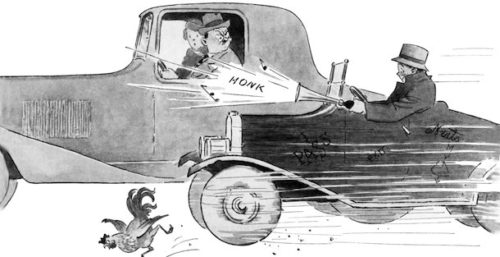
In this charming 1934 essay, the great American poet and humorist treats on the “in-between” generation — those who grew up while the horse and buggy was giving way to the automobile, and trusting in neither.
Psychiatrists differ among themselves as to just what is the most important step in the progress of the human male toward the complete life. They differ noisily, they differ bitterly, pausing occasionally to split the profits resulting from the argument, then resuming anew, as psychiatrists will. “The first kiss,” says Vienna. “The first shaving lotion,” says Berlin. “The first tail coat,” says London. New York holds out for the first weekly salary check, while Baltimore meekly suggests that the first approach of paternity may mean a lot.
The only conclusion to be drawn from this futile bickering is that psychiatry is not only in its infancy, as the doctors themselves admit, but lingers in the halcyon days before horseless carriages, when people could think of no better ways to pass the time than osculation, self-adornment, self-support, and matrimony. Lurking in the furthermost leather recesses of their secluded and luxurious consulting rooms, lost in morbid contemplation of the horrific and scandalous details that fill their case books, psychiatrists have failed to remark a fact now so well established as to be obvious to any mind but their own — that modern man begins to live life to the utmost only after he has driven his first car its first 1,000 miles. Take the case of Mr. Migg.
Mr. Migg belongs to the unhappy generation that was psychologically squashed between the tailboard of the buggy and the acetylene headlights of the Pope Toledo. Children born five years earlier than he, arrived with a curry comb in one hand and a bridle in the other; five years later, they wore goggles and were equipped with drivers’ licenses. To this in-between generation belongs the doubtful privilege of instinctively distrusting both the horse and the automobile.
People proud of their modernity spoke rudely of horses during Mr. Migg’s childhood; they wondered how they had ever put up with horses; their skittishness, their viciousness, their sloth, their undependability; Mr. Migg received the ineradicable impression that a horse was a combination of tapeworm, tiger, and tornado. He was definitely off horses. Once in his youth he gave a horse an apple because a girl asked him to and stood over him till he did it. He thinks it was the bravest act of his life, for he expected to lose his arm at the elbow. True, he still has his arm, but only, he is convinced, because that horse at that moment was gorged with elbows.
On the other hand, the very people who were selling their horses down the river, trading in their whips for monkey wrenches, and turning their stables into garages, planted in Mr. Migg’s mind a leeriness of automobiles which it has taken many years to uproot. The conversation of the pioneer motorist was prideful, but it reeked of disaster. It seemed to Mr. Migg that automobiles were always breaking down or blowing up. If he had to go from one place to another, he thought, give him the good old choo-choos every time.
Years passed. Automotive engineers spent thousands of sleepless nights figuring out ways to make life easier for the motorist. Finally one automotive engineer said to another automotive engineer, “I’ve got it;” and the other automotive engineer said, “What?” and the first automotive engineer said, “Let’s fix it so the motorist can motor sitting down.” Everybody thought that was a splendid idea and wondered why no one had ever thought of it before. The first step was to move the gasoline tank out from under the front seat. There was some stiff opposition to this move, as many people complained that getting out and lifting up the front seat every 10 gallons or so gave them a needed opportunity to recover hairpins, love letters, odd change, latch keys, and other small objects which they had been wondering where they were for days. Public reaction, on the whole, however, was favorable, and the automotive engineers went ahead. Lights, for example. It used to take two people to turn the lights on. One to stand twisting the jigger on the acetylene tank on the running board, and another to stand with a lighted match by the headlights. It could be done by one man, but he had to be exceptionally fast on his feet. If he took too long to cover the ground between the tank and the headlights, he was likely to be blown into the livery stable when he applied the match. This elaborate process finally struck some automotive engineer as being highly inconvenient. He was probably a slow-moving man with sore feet; at any rate, he succeeded in correcting it, and the rest of us can now turn on the lights without first stopping the car.
The designers were overcoming Mr. Migg’s prejudices one by one. When they fixed it so that you could start the engine without going out front and winding it up, he succumbed. He even speculated timidly on the possibility of some day learning to drive. It took several years for this idea to blossom, but eventually, on entering college, he borrowed his roommate’s car, somehow passed a Massachusetts driver’s test, and three hours later, turning out to avoid a truck, drove rapidly into the side of the Odd Fellows’ Hall in Portsmouth, Rhode Island. He left his roommate to cope with the Odd Fellows and took a train back to Boston.
The next time he straddled a steering rod was, as in the episode of the horse and the apple, at the instigation of a lady. She would like to go for a drive in the country, she said. Mr. Migg could think of no one who would not be better off for a drive in the country, and he said so. It was only then that he discovered that the lady did not drive. She could, she said, get her brother to drive, if Mr. Migg wouldn’t mind sitting in the backseat. Mr. Migg said he loved driving. They set off in a stream of traffic that failed to diminish as they left the city limits behind. Nevertheless, all went swimmingly till, halfway up a steep hill, the lady decided that she liked the looks of a little road leading off to the left. Chivalrous as always, Mr. Migg stuck out his hand, racked the gears to shreds, stalled the motor, and coasted backwards to the foot of the hill through a shrieking maze of infuriated 10-ton trucks. “I guess you’re not used to this car,” she said kindly. Mr. Migg agreed, and started up the hill again. After a few more failed attempts, she said she thought she remembered hearing that there were bandits or wild dogs or something along that road to the left and she’d just as soon go straight home.
He passed the next few years pleasantly in qualifying for a driver’s license in New York State. He finally obtained it, and almost immediately found himself the head of a family three states away. Cause and result? Mr. Migg hesitates to say. He only knows that he found that he and his wife would have to get a car, and get one immediate.
Once having bought his own car, he could think of nothing else but getting those first 1,000 miles under his belt. Mr. Migg begs for errands to drive. He drives to the mail box and the drug store and the grocery store, none of them farther distant from the house than a clean three-base hit, and he wishes he could drive from the living room into the dining room. When you’re trying to cover 1,000 miles at 27 miles an hour every inch counts. If the Miggs have the choice of several movies, they go not to the best but to the farthest. Old ladies far out in the country whom they haven’t seen in years are being surprised every day by little visits from the Miggs. They never lose a chance to take people home from parties, particularly if they live well out of the way. They are getting quite a reputation for being friendly and obliging.
Mr. Migg still winces when he has to pull over to let a homemade sports roadster go by. But he checked the mileage this morning. Only 57 more to go. Only 57 miles from manhood. He notices that the speedometer registers up to 95.
—“The First Thousand Miles,”
The Saturday Evening Post, February 24, 1934
Master of the Seascape Christopher Blossom
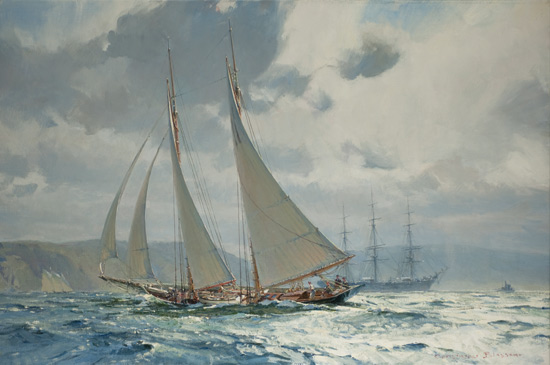
Christopher Blossom has dreamed of tall wooden ships his whole life.
Enchanted by their mystique, he has watched the great vessels wend in and out of ports near his home in coastal Connecticut. He’s studied the lore of cutters, frigates, men-of-war, schooners, and other craft, and he’s brought their dramatic stories to life. A sailor for nearly as long as he can remember, Blossom grew up, too, around legendary people considered the tall ships of their own time — illustrators who painted the visual narratives of American life and history for the popular magazines of their day.
For Blossom, counted today among the greatest marine artists of his generation, those esteemed illustrators included his own late father, David Blossom, grandad Earl Blossom, and a broad circle of friends whose resonant work resides in museums and prominent personal collections. “Landing assignments with The Saturday Evening Post was considered the most prestigious, and winning the cover was a huge achievement,” Blossom says. “When I was young, I didn’t realize just how big it was for people of my father’s and grandfather’s eras. So many of my friends were the children of great illustrators, and when their parents’ work appeared in the popular magazines you saw at newsstands, you didn’t think about the fact that millions of people were seeing those pictures around the world.”
No one is more familiar with Blossom’s legacy than J. Russell Jinishian, owner of an eponymous art gallery in Fairfield, Connecticut, that represents the biggest names in contemporary marine and sporting art. Jinishian authored a book, Bound for Blue Water: Contemporary American Marine Art, that chronicles the best painters of the last 50 years. He puts Blossom at the very top.
“You have to understand that Chris is part of a very unusual lineage. The sons and daughters of most reputable artists tend to become anything but artists. Chris is third-generation, and his work sets the standard,” Jinishian says. “I liken the Blossoms to the Wyeth family [N.C., Andrew, and Jamie] in terms of talent and dedication to craft. I can’t think of anyone else in a third-generation art family who has risen to the top of the field, as Chris has, in both marine art and as a plein-air painter.”

Blossom’s portrayals of near-mythic ships have earned him favorable comparisons to master marine painters John Stobart and Montague Dawson. A prime example of Blossom’s talent is a piece titled U.S. Brig Porpoise Transiting Deception Pass, June 1841. It portrays the good ship Porpoise finding its way through coastal waters around the San Juan Islands near Seattle, a course purported to be perilous and unnavigable. Blossom puts the viewer into a fateful scene that proved the premise wrong.
Striking is the calming tranquility of the painting, summoning emotions in the viewer driven as much by the effect of color and light as by the setting and subject. Indeed, Blossom uses narratives to pique our attention, but it is his command of his medium that cements a sensual connection. His paintings read visually as places we somehow recognize in our minds’ eyes. “What I am trying to paint is a particular kind of atmosphere and mood that comes through in the way you present light,” he says, noting that it might be a sanguine sunset or a storm with high seas and muted illumination. “Mood is everything. It doesn’t matter where or when in terms of an exact place. The sensation you feel is universal, and that’s what gives it veracity.” This is also why, critics say, Blossom’s paintings evince a sense of timelessness.
Born in 1956, Blossom, perhaps surprisingly, had no inclination to paint during his early teenage years. His passion was sailing. Still, as a youngster, he posed in costumes for paintings made by illustration icons, including Harold von Schmidt, a noted Post illustrator who then was in the final years of his life. “Von Schmidt would have these big Western-style barbecues every Fourth of July upstate in Connecticut,” remembers Blossom, “and many great illustrators and their families would go there to eat and shoot off fireworks.”
Von Schmidt died in Westport, Connecticut, in 1982. During his prime, he was a contemporary of Norman Rockwell and John Clymer. And he had solid friendships with N.C. Wyeth, Harvey Dunn, and Dean Cornwell, prized students of Howard Pyle, considered the godfather of the Golden Age of Illustration. Many of Pyle’s protégés had pieces published in the Post.
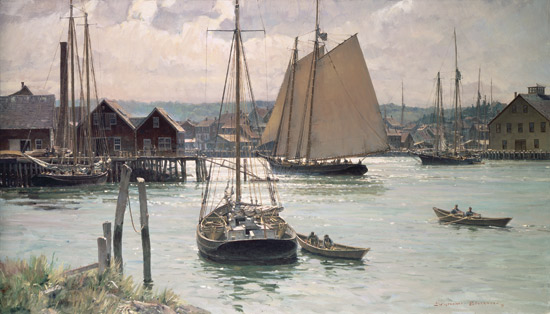
Blossom’s grandfather Earl (1891–1970) had joined the Post’s stable of go-to illustrators when Pete Martin, whom he had known in Chicago, was named the magazine’s art director. Under tight deadlines, Earl Blossom delivered paintings that illustrated fictional potboilers, a Post hallmark. Later, Earl Blossom became a star with Collier’s, and its art director there once told a reporter, “He’s a masterful artist. You never have to tell him what to do.”
Such creativity was passed down through the Blossom clan. Chris Blossom’s dad, David (1927–1995), also completed illustrations for the Post, though he is most recognized perhaps for his movie posters, especially those featuring Clint Eastwood in the Sergio Leone “spaghetti Westerns” The Good, The Bad and the Ugly; A Fistful of Dollars; and For a Few Dollars More. He also did a tremendous number of book covers and was known for doing Outdoor Life covers.
Young Chris and his brothers, David and Peter, got to know illustrators like Paul Calle, Clymer, Tom Lovell, and others who literally lived next door. Next to Rockwell, Clymer was one of the most prolific Post cover artists ever, and later, in the late 1980s after he had resettled in Jackson Hole, Wyoming, he told me that he considered Blossom a promising talent to watch.
Although Blossom was raised with his father constantly working behind the easel, the idea of making painting a career didn’t readily enter his mind until he was nearly out of high school. When Blossom did start to draw and paint, the combination of innate talent and insight absorbed through exposure to the giants of pictorial painting turned him into something of a wunderkind. He was a student at the Parsons School of Design. At age 20, he won a scholarship in a national competition sponsored by the Society of Illustrators.
Blossom’s father had earlier introduced his son to maritime painter John Stobart, a transplant from England, and they became friends. It was not uncommon for them to stop by Stobart’s studio and see what vivid paintings he was working on.
During those impressionable years, Blossom became influenced by Impressionist painters John Singer Sargent, Joaquín Sorolla, Anders Zorn, and Russian Isaak Levitan. Famously, Levitan once observed, “What can be more tragic than to feel the boundlessness of the surrounding beauty and to be able to see in it its underlying mystery … and yet to be aware of your own inability to express these large feelings.”

Blossom’s work does not stand accused of suffering from repressed passion or an inability to make visible the unseen, though his play on the past is not sentimental or cheaply nostalgic.
For a time out of college, Blossom worked as a commercial illustrator, and the toils of having to work quickly, distilling the essence of subjects down to engaging visual statements, became a training ground just as it had for the Blossom elders.
For those who dismiss painters with a commercial illustration background as second-tier, Jinishian notes, “Michelangelo was an illustrator, and he invented, out of thin air, the scenes we equate with being the highest form of art. One of the criticisms people have used over time to try and diminish the talent of the great illustrators who worked for the Post and other magazines is the argument that, because they didn’t actually witness the scenes they painted, it was conjuring. But guess what: As far as anyone knows, Michelangelo never saw the moment of creation that he depicted on the ceiling of the Sistine Chapel. Nobody ever said, ‘Mike, that’s a made-up thing you’re painting.’”
Some of Blossom’s paintings carry an intensity reflected in the stormy ocean conditions being portrayed, where textured effulgent waves are rising and falling, putting water over the gunwales. You can almost see the wind being tacked. Maybe the only things missing are an actual spray of sea salt blown into the viewer’s eyes, the briny smell of the cold Pacific, and the taste of ocean air on the tongue.
A decade ago, Blossom and his wife took a year off and sailed up and down the Eastern seaboard from Maine to the Bahamas and back. He produced a stack of plein-air paintings along the way and returned to his studio refreshed. “The power of nature is pretty awesome,” he says. “To assume that you can push the limits of risk and never get caught is a fallacy.”
Skippering boats on the open sea is exhilarating for Blossom because there’s a very small safety net, set within the overwhelming forces of nature. “The thing I find most interesting about cruising is the exhilaration of exploring and the self-sufficiency which requires that you troubleshoot problems, think things through, and adapt. Yes, we have better weather information, but you’re still on your own. You are independent and isolated in the way that an astronaut might be.”
It’s a metaphor, he notes, that can also be applied to painting. After years of winning other honors, his greatest achievement to date came in 2010, when he won the top prize at the Prix de West Exhibition in Oklahoma City for his painting Sunrise in the Golden Gate; Downeaster Benjamin F. Packard.
At Prix de West, across a span of years, Blossom prestigiously has received the coveted Robert Lougheed Award four times. The accolade is bestowed by fellow artists for best grouping of three or more paintings. (Lougheed was another illustrator who, early in his career, contributed to the Post before becoming a figure in Western art.)
While some say winning Prix de West marked Blossom’s formal arrival in the pantheon of contemporary Western artists, friends like painter Jim Morgan say it only confirms a talent that he has demonstrated for years in his forays across the inner continent of North America and Europe. Blossom is, by his own admission, a modern Romantic Realist.
Morgan himself is a widely respected oil painter known for his portrayals of wildlife and landscapes, most often Western scenes terrestrial, the influence of the Pacific overlooked. Far from the dust of a rodeo ring, Indian pueblo, or vaulting jawlines of the Rockies, this vision, too, is an important visual aspect of the American West. The nautical tradition encompasses galleons of Spanish conquistadors, exploratory British flagships, cutters carrying Asian laborers to build the transcontinental railroad, and vessels ferrying gold miners north to the Klondike à la Jack London.

Blossom may be only an itinerant Westerner, but he has tens of thousands of miles and hours under his belt in the red rock deserts, inner mountain ranges, and Pacific coastline. He has also spent countless hours prowling the Atlantic, but he does not compartmentalize one from the other. “In fact, I view my maritime work as landscape with water and vessels,” Blossom says.
“Chris’ wonderfully unique marine paintings are as much a portal into the development of the American West as a Moran, Russell, or Remington, but from the perspective of the sea,” Morgan explains. “There seems to be a deep gene pool of imaginative, deliberate, thoughtful, no-accident fine art. The creative apple seems not to have fallen far from the family tree. Chris is continuing the fine tradition of great artists.”
A Utahan, Morgan has reverence for Blossom’s ties to the grand illustration heritage of the East. He has joined Blossom on treks, via horseback, into the Western wilderness. “Chris is solidly on the creative high ground of great representational art being done today. He has few peers anywhere,” Morgan says. “No matter if the inspiration for painting is a red rock desert canyon or the high seas, it is undoubtedly of the highest quality. Subject matter aside, Chris’ art has no boundaries.”
Scott Usher, the CEO of Greenwich Workshop, which has made available a number of Blossom paintings as limited-edition prints, credits the artist’s tenacity and instinct with consistently producing head-turning work, but he notes that on top of it, “there’s this 15 percent factor of pure magic.”
Blossom ponders aloud what intrigues him about the Rocky Mountains. “Conveying distance is something that has always intrigued me. Out on the ocean, you deal with a lot of distance, but there is no scale to put it in perspective. Out west, you can see for 100 miles. Color is brilliant because the air is clear and not humid or hazy. For me, it was eye-opening, and communicating it a challenge.”
What does Blossom prefer — the mighty Atlantic or spying peaks that rise a mile and a half above sea level? “The mountains are far more impressive. Ships make for fascinating subjects, but they are beautiful things humans have created. Mountains are elemental and have a monumentality, a sense and a presence that can’t be re-created with our hands. As artists, we can only try to catch a sense of them,” Blossom says. “I understand why so many illustrators, as their profession started to die with the advent of the camera, headed west.”
“The thing that distinguishes his work, and makes it interesting, is that he’s always looking for new and unusual approaches to presenting his subjects. He could make a lot of money painting a popular setting over and over again — which some artists do — but that’s not the way he is wired,” Jinishian says. “The simple fact is that he has a way of seeing the world that is different from other artists. His art is the way he processes the world, and his paintings are like he is, loaded with creative intelligence, but very lean, with no fat.”
An exemplar of Blossom’s authenticity is Pilot Boat Mary Taylor Off Sandy Hook 1849, which celebrates a boat designed by the same shipbuilder who constructed the racing yacht America, first winner of the America’s Cup sailing trophy in 1851. Another painting, Loading Lumber in Port Blakely, portrays a seaside town in Washington State that, in the 1870s, was home to one of the largest sawmills in the country. Using floating log booms as design elements, he delivers a mesmerizing composition that is also a reference point for pondering history.
“I covet his paintings as very subtle things of singular beauty,” Jinishian says. “For him to end up on the cover of The Saturday Evening Post just has a rightness about it.”
As Blossom demonstrates in his scenes, what’s old can brandish relevance anew as we sail off into his sunsets. Just as Blossom has returned to his roots of illustration for inspiration, so, too, does the Post.
Todd Wilkinson has been writing about art, nature, and the West for nearly 30 years. His last story for the Post was on Western artist Howard Terpning for the Sept/Oct 2015 issue. His most recent book is Grizzlies of Pilgrim Creek: An Intimate Portrait of 399, the Most Famous Bear of Greater Yellowstone, with photographs by Thomas D. Mangelsen.
This article is featured in the March/April 2017 issue of The Saturday Evening Post. Subscribe to the magazine for more art, inspiring stories, fiction, humor, and features from our archives.
A Quick Guide to Impeachment
February 24 is the anniversary of President Andrew Johnson’s impeachment in 1868. Many Americans are more familiar with Bill Clinton’s impeachment than with Johnson’s, but our un-scientific survey revealed that even well-informed people are a little fuzzy on what impeachment actually is and how it works, exactly. Here’s a quick overview:
What Is Impeachment?
Impeachment means indictment — specifically, a charge of serious misconduct against a high official by a legislature. Article II of the Constitution says the president, vice president, and “civil officers of the United States” can be impeached. Whether or not members of Congress are included in “civil officers” is still debated.
Two presidents have been impeached, but neither were convicted.
What Exactly Is an Impeachable Offense?
The Constitution defines impeachable offenses as “treason, bribery, or other high crimes and misdemeanors.” But these are broad, debatable terms.
Constitutional lawyers define “high crimes and misdemeanors” as anything that breaks existing law, is an abuse of power, or, as Alexander Hamilton wrote, is “the abuse or violation of some public trust.”
Gerald R. Ford gave a working definition of an impeachable offense: “whatever a majority of the House of Representatives considers it to be at a given moment.”
In practice, articles of impeachment have cited acts that exceed the constitutional limits of the powers of an office, behavior at odds with the function and purpose of an office, or use of an office for improper purposes or personal gain.
How Does the Impeachment Process Work?
The House Indicts
The House of Representatives begins the impeachment process. The House Judiciary Committee starts the process by sending to the House articles of impeachment, a resolution that spells out why impeachment is justified. The House then debates and votes on that resolution. An official is impeached only if two-thirds of the House approves the articles of impeachment. But the House can’t take action beyond this vote, and the impeached official isn’t removed from office.
The Senate Convicts and Expels
The impeached official now faces a trial in the Senate. The Chief Justice of the Supreme Court acts as judge in the proceedings, and the Senators are the jury. After hearing the evidence, the Senators meet privately and discuss their verdict. If two-thirds of the Senators agree, the impeached official will be convicted and removed from office. The Senate may even pass a resolution forbidding the official from ever again holding public office.
Who Has Been Impeached?
- Moves toward impeachment were made against John Tyler (1841-1845) when Congress resented his use of the presidential veto, but the resolution against him failed.
- Andrew Johnson (1865-1869) was impeached for his lenient attitude toward the defeated Confederate states, which allowed many of its pre-war officials to return to office. The triggering event was his dismissal of Edwin Stanton, Lincoln’s Secretary of War, who opposed Johnson’s policies. Johnson was impeached by the House, tried in the Senate, and acquitted by a single vote.
- Congress was debating the impeachment of Richard Nixon (1969-1974) over the Watergate scandal when he resigned.
- Bill Clinton (1993-2001) was charged in 1998 with perjury and obstruction of justice in the investigation of his affair with a White House intern. He was impeached by the House but acquitted by the Senate.
Extra Credit: The First Impeachment Hearings
Americans are naturally troubled by the prospect of a presidential impeachment. In March 1868, when President Andrew Johnson was being impeached, the Post reassured readers that impeachment was a necessary, vital part of our democratic process. It contrasted, perhaps unfairly, the orderly process of trying the U.S. president to the armed turmoil shaking the governments of Mexico and Santo Domingo (now the Dominican Republic). But it expressed ultimate faith in the American people and their Constitution.
Not Mexico
For a short period dining the first excitement of the Impeachment, we began to doubt whether we were living in the United States or in Mexico — but the sober second thought of the people soon rectified the blunders of foolish partisans.
The House of Representatives has an undoubted right to impeach the President, or the Acting President, whichever his true position may be. Its members have the right to judge for themselves of the propriety of their course.
The Senate has the undoubted right — nay more it is its duty — to sit in judgment on the charges that are brought by the House — and acquit, or find guilty, as a majority of two-thirds sees proper. If the Senate finds President Johnson guilty of high crimes and misdemeanors, he must, and doubtless will, without any hesitation, conform to that judgment.
It may be said, that both House and Senate may act in the spirit of mere partisans, and alike accuse and condemn without sufficient evidence. Undoubtedly they may. But the Constitution supposes that they will not. If they do act as mere partisans, their punishment will be the rebuke of the people.
In the Autumn, the Republican party goes before the People — with its candidate for the Presidency, its candidates for Congress. The fair or unfair manner in which the Impeachment trial has been conducted, will be an important element in the canvass. In fact, the Impeachers themselves will be then put on their trial, before the great Jury of the People of the United States.
And thus there is no need of soldiers and bayonets — no need to make these United States a Mexico or St. Domingo. Ultimately all these vexed questions must be decided by the people. Ultimately the will of the people will prevail. Both the contending parties profess to desire this. Let all then be done peaceably, legally, and in order. It will be no recommendation to either party, in the great Presidential and Congressional campaign of the coming Autumn, that it has needlessly broken the peace, and plunged the Union into civil strife.
Editorial, March 7, 1868
Featured image: Impeachment ticket for President Johnson (U.S. Senate)
Open Times

Blake reaches in his pocket and fingers a blue rubber band, the thick sort with resistance. He can already see the expectant faces, hopeful faces waiting for answers to impossible questions. How do you cope with stress? Do you ever lose control? He spreads his fingers.
It’s early, just before he needs to make rounds, and he attempts a few guiding notes, some lyrical words. He browses through online databases looking for quotes that aren’t completely misguided. He writes.
My scalpel is a telephone, a way of communicating with another human being. No. My blade is a paintbrush. It’s a light, a tiny flashlight. No. My work is to navigate the map of the human body, to reveal stories that are buried beneath the skin. No.
Blake circles the words map and buried before noticing a couple standing a few feet away. Public displays of affection are tolerable some days. Not today. Today, purple clouds are closing in around them, the only three in the park so early in the morning, settled near the basketball courts. He crosses out paintbrush because the line seems too pretentious and shifts on the hard bench as thunder rolls above. The storm charges forward.
Blake closes his notebook — those precious few words contained. Writing a presentation for third-year med students, something that will inspire some and scare off those who should be saved before they’re too far in debt, is a real pain. He never imagined he’d ever have to return to the horrendous lecture halls he’d barely survived.
The couple kisses with sloppy tongues, showing off their youth, as the rain begins. With less than two hours before he needs to deliver his speech, Blake nestles the notebook in his bag and makes his way to his new, custom-built BMW 230i convertible. It’s the kind of car a younger version of himself could never imagine owning. It’s a car he can barely imagine himself owning now. Every time he walks toward it, there is the feeling that he’s won something, game-show style, and he can’t help but swagger.
His stomach revs with the engine. His machine glides through the storm. It pauses in front of Scarlet Café, which is closed, and then Blue Coffee, which is also closed. Blake is an OSU grad, hardly a Michigan fan, but the service at Blue is better.
He idles for a few minutes, peering in the windows to make out a scrawny guy, who he thinks manages the place, refilling straws. Blake wonders if he has time to wait. It’s an 8-minute drive to work, and his first appointment is in 15. He could get there in 7, but he’s cutting it close as it is, waiting for inspiration to come.
No café is open until 5:30 a.m., even though this is the med center, a part of town populated by doctors who are crepuscular animals known for their staggering caffeine dependence.
With no immediate access to decent coffee, he moves a block down and stops at the gas station, jogs toward the small shop without umbrella, and watches, disdainfully, as the off-brand coffee percolates. “One minute,” the gas station attendant says with a smile. Blake has one minute. Not much more.
He hovers around a warming oven filled with donuts, watches the icing dripping from thin metal racks, and eyes the rows of lottery tickets across the aisle. There is a cluster of women, three of them, buying scratch-offs, scratching them with quarters, then buying more or cashing in for a few bucks. They look related, these three. They look as though they inhabit a different planet, all loud pastels against a backdrop of gray.
Blake watches one of the three, a middle-aged woman in ripped jeans with a touch of jaundice, lift her arms like a superhero. She squeals, “Forty dollars, forty dollars, ya’ll!” Her friends check the ticket, recheck their own tickets, and congratulate her without any apparent sincerity. The woman turns to Blake. “You! You’re my lucky charm. I won right when you passed. Bless you. Bless you. Can I buy your coffee? Will you walk by again, just like that while I scratch this last one?”
“No worries,” he says, smiling but not moving.
“I see. Well, can you stand there awhile, while I scratch off a few more?”
The coffee is ready. Blake can make out the grounds floating on the top of murky liquid. He glances at his smartwatch. “One more, then I have to go.” There is a short bottle of liquid next to him that promises a cornucopia of vitamins, along with a healthy dose of caffeine. It appears to be marketed as a panacea, with so many promises listed on the label that there is no room for readable text. He places it, along with a pack of gum fortified with Vitamin B2, on the counter.
“You a doctor?” the youngest of the women asks as he unrolls a few dollars from his money clip to pay. Her ball cap is bejeweled and spells out U.S.A.
“Have a good day, ladies,” he says, leaving them to tease out the mystery. His phone vibrates. He rushes out without getting his change, hearing another yelp of joy as he walks out and wondering what kind of jackpot was achieved.
Blake’s machine is efficient on wet roads, far more so than the Jeep he used to drive when he was still paying off loans. The tires do their work, angling and gripping and getting him to the dozen-decker parking lot without so much as a slip or skid. He takes one of the first reserved spots. Glancing in the rearview, he sees the gray in his beard. He downs the syrupy contents of the small bottle and scrambles to open the driver’s side door in enough time to spit it out. He jogs toward his office to collect his thoughts, his mouth watering around the acerbic remnants of the toxic energy drink.
The hospital café isn’t open till 8 a.m., and he has only a few minutes to sign in. He must check on two patients, then deliver his speech. The idea hits him that there should be drones delivering quality coffee to doctors at the press of a button, and he jots this note down. 5:30 a.m. exactly, and as he strides down the linoleum halls, he calls Blue Coffee, requesting a special delivery. He’ll order coffee for the whole floor so it doesn’t look so self-indulgent. He assures he’ll tip well.
As he waits, he finds a French press and searches his office for some leftover grounds. Nothing. Ani, one of his favorite baristas and usually the cashier at Blue Coffee, says she’ll check with her boss but will try to make it happen.
“So long as you can get me that coffee before 7 a.m. I have a speech to deliver,” he explains, angling the phone on his shoulder as he checks the break room, only to find some instant coffee — hardly enough for a cup.
After the third hold song, Ani returns. “I got it approved,” she says. “I’ll be there in a jiff.”
From Room 8A, Blake and his patient watch the rain as they go down a series of follow-up questions. Mr. Heller explains that he is in a lot of pain and would kindly like some Xanax. Blake assures him that the pain is temporary, and that the incision appears fine. “It’s healing just fine,” he says, assuredly, then offers a smile-nod combo that he tends to offer when refusing Xanax. He tells Mr. Heller to watch the rain a moment. “How’s your breathing?” he asks. “Really pay attention.”
A fill-in nurse, someone named Trudy, concurs. Mr. Heller breathes. He breathes slower, watches the rain, and, finally, closes his eyes.
“No one else can do that,” the nurse whispers on their way out. Blake worries she’s right.
The thing about Blake is, he knows how to focus — no matter caffeine withdrawal or whatever else. But as soon as he’s out of 8A, he’s wondering where Ani is. He checks his watch. Only 7,034 steps. Did he give her clear enough instructions? Does she have the common sense to take one of the good, RESERVED spots in the lot as opposed to walking a damn block from the visitors’ area?
Patient No. 2 is not an easy one. Mrs. Sebastian Willow, who insists being referred to as such, is what lesser doctors refer to as a frequent flyer. This is her third carpal surgery, second wrist. Blake counts backwards from 100 as he suits up. He’s filling in for yet another new surgeon who didn’t sign up on his round.
The precision of an endoscopic surgery for carpal on a woman with the tiniest wrists he’s seen in his lifetime is not something he’d been looking forward to, but it is something he will execute with precision and grace. Five, four, three, two … one. He enters the room to meet with two assistants and his station set up to perfection. The tiny tools that were once fumbled and dropped with his clumsy, big hands, are now a part of him, an 11th finger or a mechanical extension. He cuts away the flesh and navigates around the thin line to avoid nerve damage. He feels the pressure release, subtle, or thinks he does, as he places tiny incisions. This woman will be back to texting in a few hours.
Ms. Sebastian Willow will be checked out as soon as her paperwork is complete, Blake explains. He provides her with aftercare instructions and tells her to stay off Facebook for a while.
“Instagram okay?”
The coffee should be here. Blake made good time. He has almost 20 minutes to spare before his presentation and, still with no idea what to say, he figures he could give an account of the very surgery he just completed. Perhaps he could frame an entire speech around a surgery. His head screams at him, somewhere along the forehead just above the eyebrows. It screams out in withdrawal.
Speed-walking to the front desk, Blake glances down at his watch to see 11,000 steps. Most people are just waking up. He asks if someone has been around to deliver coffee, and Anita, the receptionist with phenomenally big hair and watery eyes, says no.
Blake’s headache seems to be wrapping around his head, scarf-like, now. He rushes down the hall, toward the parking lot, wondering if he could make it back to the gas station in time to return for his speech. He recalls the anxiety attacks he used to have in front of groups, the terror of being unprepared. He imagines himself in the audience of students, bored and eager all at the same, waiting to be a doctor. He remembers the invincibility of promise, endless promise. He tells Anita to wish him luck.
“Sweetie,” she says, with a maternal sweetness. “You got this, whatever it is.”
He lets out a breathy laugh as Ani, resplendent Ani, arrives with a tray full off coffee and one single small cup that promises to hold a quad espresso just for him. He wants to tip her $100. He reaches out his arms in joy as though ready to hug her as she sets the tray down on the counter.
He pulls out a $50 and hands it to her, which he thinks will leave her $10 for the trip. She smiles and turns on a heel, waving goodbye and explaining that she wants to beat the storm on the way back.
“Thank you,” he calls out. He sees she drops something, the cash! And he calls out, gesturing quickly to get her attention before she is out of earshot. Just as she turns, his hand gestures down. The tiny cup, the glorious one, falls to the ground. The small plastic lid bounces off and lands beneath a chair. The golden-brown liquid turns to a small puddle near Blake’s feet.
As the puddle spreads, a woman in a wheelchair screams out in pain. There is an emergency laparoscopic call to action. Blake counts backwards from 100. He realizes he’s the only one on-call right now and will have to meet with the students late.
The life of a surgeon, he’ll say, is such that you cannot over-prepare. Now is the only time you’ll have. Take advantage of it. The things, the lifestyle, the fancy car you may be able to afford, are all simply ways to get you back to the core, this hospital, where you will live to save others from pain.
Blake stands in front of over 100 med students and recounts his morning. “I’ve hit 21,000 steps since 4 a.m., I’d really like a cup of coffee, and I’ve met with three patients, executing two surgeries, one of which was an emergency.” He goes on. He examines their eyes, pulling a small rubber band out of his pocket. “I count down from 100 whenever I need to find my center. I stretch this small rubber band with each count.”
Four students drop out that week. Blake receives a single note, which Anita delivers with a smile. “It has a gift card in it, I think!”
When Blake opens it, he is in his office. It’s a Friday, and he’s fully caffeinated. It is a thank-you note from a student who says she is third year. The small plastic card containing a mantra: “Go on,” and the handwritten note, resplendent in barely readable doctor scrawl, simply says, “I carry a rubber band now. I’m ready.”
“Sure are,” Blake says. He reaches in his pocket, stretches the band, and takes a breath. The clock, such an archaic and beautiful thing, ticks, and he thinks about how precise the gears must fit to balance time. He looks down at his smartwatch and sees 28,439 steps. He writes the number down in a small notebook before standing to stretch, walking slowly toward his perfect car. He heads home to a quiet apartment, where he will sit with a novel, pausing now and again to acknowledge the hope he feels for the world.
News of the Week: Presidents, Pluto, and the Perfect Snacks for Oscar Night
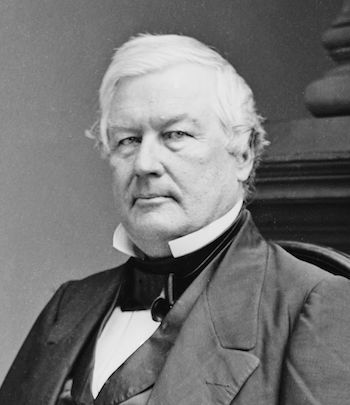
And the Greatest President of All Time Is…
… Millard Fillmore! That’s right, according to a new survey that ranks our nation’s leaders over the years, the greatest president of all time is Millard Fillmore.
Okay, I’m lying (or maybe I’m just providing “alternative facts”). C-SPAN conducted a Presidential Historians Survey to rank the U.S. presidents. It’s probably not a surprise that Abraham Lincoln tops the list, followed by George Washington and Franklin Delano Roosevelt. But what about John F. Kennedy placing above Ronald Reagan? Or Barack Obama placing 12th even though he just left office?
William Henry Harrison isn’t last, even though he was only in office for 31 days. (He didn’t listen to his mom when she told him to wear a coat at the inauguration and died from pneumonia.) This is one of those surveys that’s built for an argument.
We once had a president named Chester Arthur. I always forget that.
NASA Wants to Make Pluto a Planet Again
Poor Pluto. One day you’re a planet, the next you’re not. But it’s another day, and maybe you’re going to be one once again.
Scientists at NASA are thinking about changing the definition of what a planet is, which means that Pluto — which was demoted to “dwarf planet” status in 2006 — could become a planet once again. Alan Stern, the principal investigator on NASA’s New Horizons, calls the demotion of Pluto “b***s***.” NASA scientists swear like sailors.
This isn’t the only space news from the space agency this week. They also announced that they’ve found several Earth-sized planets 40 light-years away, and some of them might contain water and could sustain life.
I wonder if Pluto’s upgrade means that other objects in our galaxy will also have to be upgraded to planet status. Seems only fair. They could name them Mickey and Goofy.
90 Years of NBC
 The Peacock Network’s special this week answered the question: “Is it possible for a three-hour history of a TV network to move along quickly and still be incredibly boring?” The answer would be yes.
The Peacock Network’s special this week answered the question: “Is it possible for a three-hour history of a TV network to move along quickly and still be incredibly boring?” The answer would be yes.
Kelsey Grammer hosted the event (that you can watch online), which was billed as “The Paley Center Salutes NBC,” even if there didn’t seem to be much Paley Center involvement beyond the title. It’s just a stiff Grammer talking about the network and introducing clips centered on genres (comedy, drama, variety show, news, etc.) and interviews with stars.
It would have been better to have a chronological history of the network (they had three hours!) and to have given less time to shows that debuted in the past 20 years (and in some cases are still on). It’s great to see clips from the shows of the ’40s, ’50s, and ’60s, but there weren’t enough of them. (And did anyone really want to see Jennifer Lopez’s thoughts on the network just because she’s currently starring in Shades of Blue?) It was also oddly filmed. The interviews with the celebrities were filmed in such a way that they cut off the sides of faces of people like Helen Hunt and Paul Reiser. I bet they were mad about that.
By the way, they didn’t mention Bill Cosby or The Cosby Show that much. Not sure why.
75 Years of The New York Times Crossword Puzzle
I keep forgetting to do The New York Times crossword. Does that make sense? I love crosswords, and the Times’ puzzles are the gold standard, but for some reason I don’t think of doing them. I don’t think of doing any crosswords, actually. I watch Wheel of Fortune every night, though.
This year marks the 75th anniversary of the puzzles in The New York Times. The paper has a great feature on them, including a timeline (the paper initially didn’t want to run crosswords and called them “a sinful waste of time”), a profile of the various editors the crossword section has had (they’ve only had four in 75 years), and a reprint of the very first crossword that appeared in the paper in 1942. Let me know if you figure out what an “obovoid pome” is.
CBS Sunday Morning had a great profile on current New York Times crossword editor Will Shortz this week that talked about his big obsession (besides crossword puzzles). It’s table tennis:
RIP Norma McCorvey, Warren Frost, Richard Schickel, Clyde Stubblefield, and Alan Colmes
You know Norma McCorvey under her other name: Jane Roe. She was the plaintiff in the famous 1973 Roe v. Wade Supreme Court case that made abortion legal. In her later years, she actually became pro-life and regretted her decision. McCorvey passed away at the age of 69.
Warren Frost joined the Navy when he was 17, was at Normandy on D-Day, and later became a teacher at the University of Minnesota. Oh, he also played Susan’s father on Seinfeld (Kramer burned down his cabin), Doc Hayward on Twin Peaks (his son Mark created the show), and was in such movies as Slaughterhouse-Five, War of the Colossal Beast, and The Mating Game and TV shows like Matlock, The Larry Sanders Show, The Stand, and Playhouse 90. He’ll also appear in the Twin Peaks sequel that premieres on Showtime in May.
Frost died last week at the age of 91.
Richard Schickel was the film critic at Time for 38 years, and before that was the film critic for Life. He also wrote 37 books, penned reviews and essays for The Los Angeles Times Book Review, and directed many documentaries.
He passed away Saturday at the age of 84.
You probably heard Clyde Stubblefield playing drums at some point recently because a short drum pattern he performed in 1969 in the James Brown song “Funky Drummer” has been sampled in many pop and hip-hop songs over the years, including George Michael’s “Freedom ’90,” Public Enemy’s “Fight the Power,” and Sinead O’Connor’s “I Am Stretched on Your Grave.” Some estimates say it has been used in over 1,000 songs.
Stubblefield passed away last weekend from kidney failure at the age of 73.
Alan Colmes was the liberal part of the Fox News show Hannity & Colmes for many years. After that show ended, he continued his Alan Colmes Show radio program and appeared on the network on various shows, including The O’Reilly Factor. He was also the author of several books.
Colmes died yesterday at the age of 66 after a brief illness.
This Week in History
Japanese Internment Begins (February 19, 1942)
The aforementioned Roosevelt ordered the deportation and incarceration of over 110,000 Japanese and Japanese descendants on the West Coast, Midwest, and South. Saturday Evening Post Archives Director Jeff Nilsson has a fascinating history of the order and discusses a 1939 SEP article by Magner White. Star Trek actor George Takei often talks about his experience in one of the camps.
President Andrew Johnson Impeached (February 24, 1868)
The Democrat missed being removed from office by only one vote, and if C-SPAN did a list of the best vice presidents, he probably wouldn’t be on it.
This Week in Saturday Evening Post History: Sunday Paper Cover (February 21, 1948)
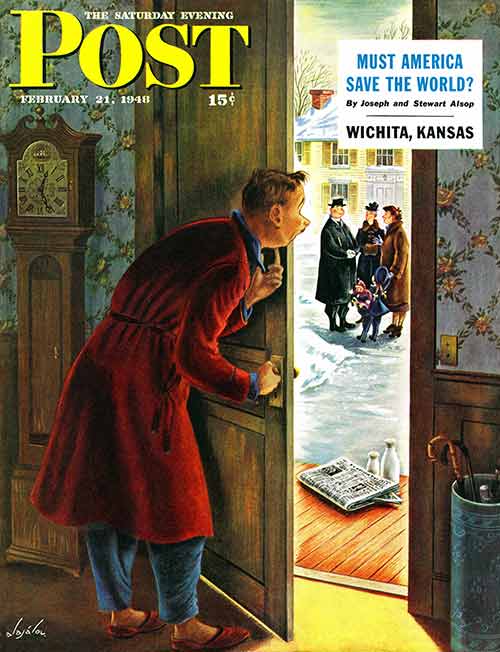
“Sunday Paper”
From February 21, 1948
It took me a while to figure out what’s happening in this terrific cover by Constantin Alajálov. The man is hiding behind the door because it’s Sunday and he just ditched church. Who’s outside his door? The minister, of course, and now the guy can’t get to his paper and bottled milk.
The cover probably doesn’t make sense to a lot of younger people today. Is not going to church really such a big deal? And why the heck would anyone get bottled milk delivered to their house?
Oscar Night
There are two ways to celebrate the Academy Awards, which air on ABC this Sunday starting at 7 p.m. Eastern (though the red carpet show starts — and I’m not kidding — at 1:30 on E!). You can dress up in a tux and roll out a red carpet in your living room and serve things like filet mignon and martinis, or maybe you’re more of a popcorn-and-pizza type of person. I’m going to assume the latter.
The Pocket Change Gourmet has several recipes for the night, including Queso Dip, Spiced Nuts, and Academy Award Oscar Cupcakes, while Food & Wine has seven — seven! — ways you can eat popcorn. You might also need a good recipe for guacamole and salsa. Or you could just get on the phone and order Domino’s. Hey, if you can use their wedding registry, you can have it on Oscar night.
I haven’t seen any of the nominated films, but I’m just going to assume La La Land is going to win everything.
Next Week’s Holidays and Events
Mardi Gras (February 28)
This day is also known as Fat Tuesday, and the first one was held in 1857. Even though the celebration starts today, the parades actually started in January.
Ash Wednesday (March 1)
The ash is from the palm branches blessed on last year’s Palm Sunday, and they are pressed into the foreheads of worshippers in the sign of the cross. I remember this from Sunday school.
National Salesperson Day (March 3)
The term salesperson encompasses a large group of people, from insurance salespeople and retail store clerks to the little ones who sell Girl Scout cookies and writers who want you to buy their writing, so this sounds like a day for all of us.
From the Archive: Critics from 1978 Pick the Best from 50 Years of Movies
Post editors from 1978, pooling 50 years of favorites, joined distinguished film critics Rex Reed and John Simon and the American Film Institute in daring to choose the best movies, actors and actresses of all time: You may not agree with the choices but they call up happy hours spent in the dark.
The American Film Institute picks the 50 best movies. The top 10 are:
- The African Queen (1952)
- Casablanca (1942)
- Citizen Kane (1941)
- Gone With the Wind (1939)
- The Grapes of Wrath (1940)
- One Flew Over the Cuckoo’s Nest (1975)
- Singin’ in the Rain (1952)
- Star Wars (1977)
- 2001: A Space Odyssey (1968)
- The Wizard of Oz (1939)
The next 40 are:
- All About Eve (1950)
- All Quiet on the Western Front (1930)
- All the President’s Men (1976)
- Ben Hur (1959)
- The Best Years of Our Lives (1946)
- The Birth of a Nation (1915)
- Bridge on the River Kwai (1957)
- Butch Cassidy & the Sundance Kid (1969)
- Cabaret (1972)
- Chinatown (1974)
- City Lights (1931)
- Strangelove (1964)
- Fantasia (1940)
- The General (1927)
- The Godfather (1972)
- The Godfather, Part II (1974)
- The Graduate (1967)
- High Noon (1952)
- Intolerance (1916)
- It Happened One Night (1934)
- It’s a Wonderful Life (1946)
- Jaws (1976)
- King Kong (1933)
- Lawrence of Arabia (1962)
- The Maltese Falcon (1941)
- Midnight Cowboy (1969)
- Modern Times (1936)
- Nashville (1975)
- On the Waterfront (1954)
- Psycho (1960)
- Rocky (1976)
- Snow White & the Seven Dwarfs (1938)
- The Sound of Music (1965)
- The Sting (1973)
- A Streetcar Named Desire (1951)
- Sunset Boulevard (1950)
- To Kill a Mockingbird (1962)
- The Treasure of the Sierra Madre (1948)
- West Side Story (1961)
- Wuthering Heights (1939)
Best Movie
Gone With the Wind: Although there have been more artistic triumphs, it is the film I’ve seen most and I have never been even slightly bored or disappointed. Forty years later, it is still freshly minted.
Rex Reed
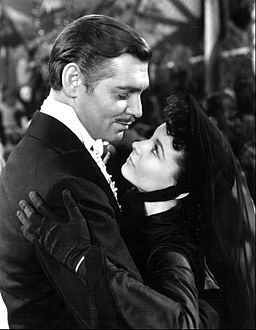
Badlands is the only completely successful film made in Hollywood by an individual — Terrence Malick — whose vision is realized in every aspect of the movie. In other words, the triumph of the individual over the corporate system.
John Simon
The Wizard of Oz: Its irrepressible good humor, its innocence, its compartmentalization of good and evil, its exuberant songs and dances which fit perfectly within the willing, oh-so willing, suspension of disbelief, its characters, its stars, its child, its dog, its allegorical interest make it that great rarity, a family favorite, a signal of joy to moviegoers and television watchers all over the world.
Editors
Best Actor
Spencer Tracy was all things to all people; he knew his craft brilliantly, yet created the illusion that what you were seeing was effortless.
Rex Reed
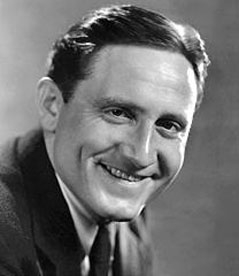
Fredric March was the most graceful, intelligent, and versatile actor in American movies, as good at dramatic as at comic roles, as fine as leading man as he was as character actor. Yet he has been unjustly overshadowed by flashy performers of far less substance.
John Simon
Sir Alec Guinness takes you into his confidence with an intimacy so pleasant and yet with a sweep so grand — from The Lavender Hill Mob to Star Wars, from Great Expectations to The Bridge on the River Kwai — that his acting becomes an analysis of your possibilities, your past, your sense of all that the world has accomplished. This is the triumph of a great actor, the giving of his audience to itself.
Editors
Best Actress
Audrey Hepburn never made a wrong move, she made even bad movies memorable, and she spanned three decades without ever losing her “star” status. Or — Judy Garland who did the same thing!
Rex Reed
Jane Fonda (in Klute, They Shoot Horses, Don’t They?, and Coming Home): A splendid comedienne, a perceptively incisive dramatic actress, a woman of loveliness that is not of the usual Hollywood sort, and an artist who keeps growing from part to part.
John Simon

Elizabeth Taylor’s stunning beauty, her precise articulation, her sense of real stardom have made literature of a number of her films — National Velvet, Cat on a Hot Tin Roof, Who’s Afraid of Virginia Woolf? — literature in which she performs in comfortable equality with the stories’ creators: Enid Bagnold, Tennessee Williams, Edward Albee.
Editors
Rex Reed, Syndicated columnist
BEST SUPPORTING ACTOR
Clifton Webb never achieved the leading-man status he deserved, but he brought class to films at a time when it was badly needed.
BEST SUPPORTING ACTRESS
Thelma Ritter: Although she never won an Oscar, she was continually nominated for adding magic and mirth to films in which even the stars were often negligible. She was (and still is) more memorable than the films she appeared in.
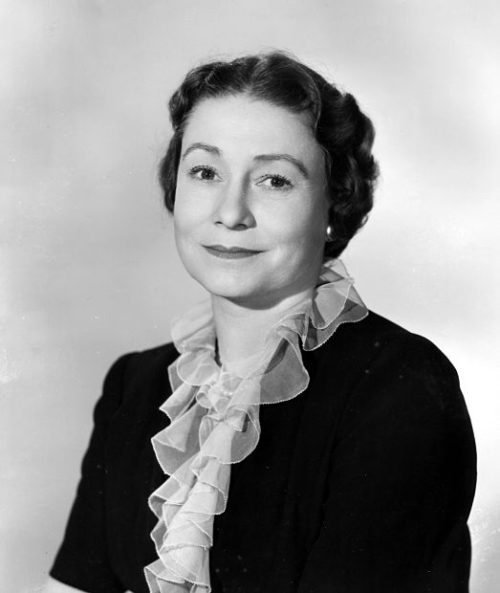
DIRECTOR
Fred Zinnemann avoided the “auteur” stamp and turned out many different kinds of movies, each speaking artistically on its own terms. Each time the theme of the small person triumphing in a harsh world came through valiantly, from From Here to Eternity to The Member of the Wedding.
ANIMAL MOVIE
Lassie Come Home (and all of the sequels in that M-G-M series): Still the best of the animal films and even today, it gets me in the tear ducts every time.
COMEDY
Some Like It Hot enlarged the “war between the sexes” theme in ways most audiences never contemplated before.
EPIC
Bondarchuk’s Russian War and Peace taught me how new uses could be made of extras. The crowds took on a personality of their own to create an astonishing canvas of an era. So did the battles.
MUSICAL
Singin’ in the Rain proved Hollywood does it better than anyone else. It also used color, music, choreography, writing, and visual splendor to the fullest without losing a grip on its story line. It all added up to masterful entertainment.
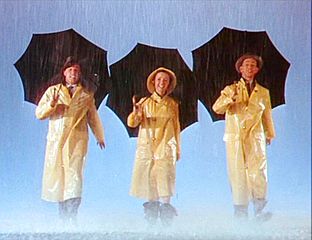
MYSTERY
Citizen Kane enlarged our scope of what the film medium can do, told a riveting story, and was so original in concept everyone has been copying it ever since.
LOVE STORY
Mrs. Miniver glorified good people who believed in achieving inner success through their deeds rather than through their sexuality.
WAR
The Best Years of Our Lives: Without one shot of a gun going off or a limb being blown up, it investigated the hearts, emotions, minds, and doubts of the men who make wars happen. It also told the story of American heroism better than any other film about the war years, without ever visiting the battlefront.
WESTERN
Two favorites here. Stagecoach: While it enlarged our view of a time and place, it demonstrated brilliant cinematic use of a diversity of characters in a tight situation; and Shane: It took the time to develop emotional attitudes in its characters instead of using Western myths as clichés.
John Simon, Film critic for New York magazine
BEST SUPPORTING ACTOR
Leslie Howard in Gone With the Wind: The only way one can pick the best supporting actor in 50 years — a rather absurd thing to have to do — is to free associate. The first name that comes into your mind must have a special, almost mystical, significance.
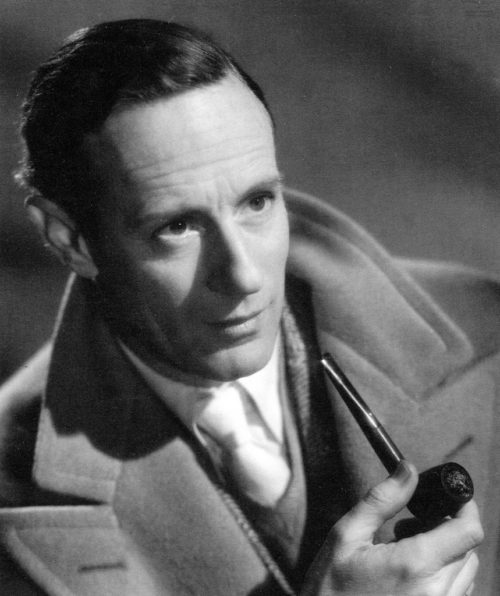
BEST SUPPORTING ACTRESS
Claire Trevor in Key Largo: Same as above. This is the first supporting performance by an actress that presented itself to me.
DIRECTOR
Stanley Kubrick is the only American director who is represented by two movies in what follows.
ANIMAL MOVIE
The Roots of Heaven: Most animal films are about the lovableness or heroism of a particular animal; The Roots of Heaven was about something bigger — the need to preserve endangered species — and made a convincing case against the vileness of elephant hunters, and, by implication, other kinds of game hunters.
COMEDY
Dr. Strangelove: or How I Learned to Stop Worrying and Love the Bomb is a rare absurdist comedy with very serious implications. It is screamingly funny while making its highly important anti-nuclear war statement.
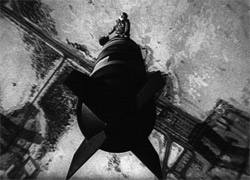
EPIC
Lawrence of Arabia: Despite some flaws (notably some cutting after release, as well as additions for the re-release), this is the only epic film with genuine intellectual and artistic values as well as true filmmaking skills.
MUSICAL
Top Hat: The Rogers-Astaire films had good music, excellent dancing, and none of the pretentiousness of movies like Singin’ in the Rain. I’m not sure whether Top Hat was the best of them, but it represents them well and is the best remembered.
MYSTERY
Strangers on a Train: The master of mystery was, as any child knows, Hitchcock. Which of his many solid mysteries was the best may remain a mystery forever, but this one had the most provocative plot, believable characters, and tremendous suspense.
LOVE STORY
The African Queen is more than just a charming romance — the story of love coming to unlikely middle-aged people and transforming them, through genuine mutual respect, into finer, socially responsible human beings.
WAR
Paths of Glory: Among many so-called antiwar films, it may be the only one that — without forsaking the bounds of believability — shows the true dirtiness of war. There is no sense of heroism, nobility, or whatever; only horror.
WESTERN
No choice in this category. The Western is basically an infantile genre. It either idealizes false values, while also insulting the Indians, or else it is an anti-Western, scoring easy points by inverting to usual Westerns, which is facile and also infantile.
Editors, The Saturday Evening Post
BEST SUPPORTING ACTOR
Villains are, by definition, not heroes, not stars, and although Sidney Greenstreet was a superb and successful stage actor and played several good-guy roles in the movies, and although Peter Lorre had a likewise outstanding career, both were most memorable as villains (especially in Casablanca and The Maltese Falcon), no-goods who had to get theirs in the end. But they were both so very good at being very bad.
BEST SUPPORTING ACTRESS
Agnes Moorehead: Her real tragedy was that no one saw how pretty she was. Never one to sulk, she conquered character roles, putting on a shrewish hue, listening to the role instead of her own vanity, creating a workable relation — one that audiences could sympathize with and understand — with the dark side of the human condition.
DIRECTOR
Ingmar Bergman: While American movies were veering dangerously toward a Doris Day/light comedy repertory, the Swedish moviemaker introduced an incisive probe into the mystical human spirit, creating such beautiful films as Wild Strawberries, The Seventh Seal, and Cries and Whispers on a pathetic budget to show Hollywood that there was such a thing as more taste than money.
ANIMAL MOVIE
National Velvet was a horse race which the audience won. Child stars “Butch” Jenkins (who retired at age 10), Mickey Rooney, and Elizabeth Taylor under the superb professionalism of Angela Lansbury and Anne Revere turned Enid Bagnold’s classic children’s story into a pride of faith and hope.
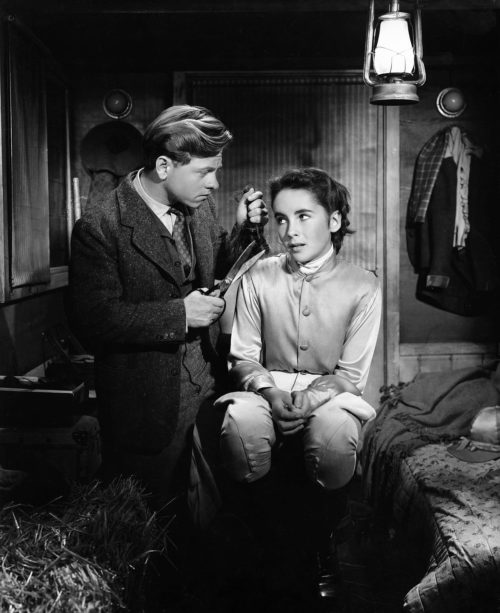
COMEDY
The Graduate: A good moviemaker, Mike Nichols, at his best, and a wonderful actor, Dustin Hoffman, at better than his best, which is considerable. You just cannot stop laughing, all the time knowing that you shouldn’t be laughing, Benjamin’s problems aren’t funny, they’re so real and tragic it hurts, but so funny, lord. I mean, plastics? Plastics?
EPIC
Apparently an epic movie is one that has battle scenes and an intermission. Both parts of The Godfather are a little shy on battle scenes (not on killings, certainly, but on mass fights), and a sequel may not be quite the same as a second act. But both movies were unusually long, and considered together — television even went so far as to sort things out, chronologically — they certainly qualify. It is (they are?) an epic, and of a new, more honest, less grand, and thus more powerful ilk.
MUSICAL
High Society — The Philadelphia Story with Cole Porter’s songs; Louis Armstrong’s brilliant and contagious happiness; the glacially pretty Grace Kelly; Mr. Cool, Bing Crosby; Frank Sinatra; and one of the straightest, best songs of any movie, “True Love” — offers classy entertainment completely devoid of snobbery.
MYSTERY
Two choices here, necessarily. Lady from Shanghai, because its technical achievements — camera angles, lighting, superb editing, all the Orson Welles trademarks — are so immense and intense that the mystery is as much in how such a movie could come into being as in the nevertheless hypnotic plot. And, for Bogart’s sake, The Maltese Falcon. One of his finest performances, in the kind of role he handled best. The Sam Spade, Philip Marlowesque private eye who is stabbed in the back by everyone including the beautiful girl, especially the beautiful girl. Who survives, but loses everything, including any idea of why or what he has lost.
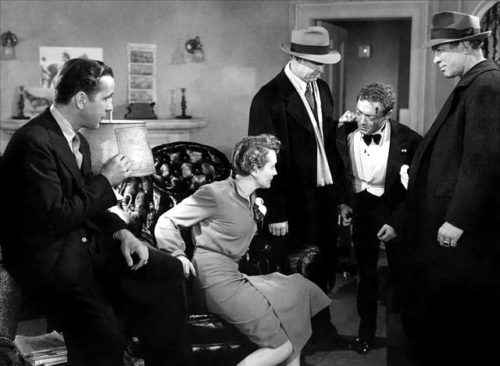
LOVE STORY
D. H. Lawrence’s novel, Women in Love, was transformed by Ken Russell into a rich tapestry of love and class where the body and affection ruled inheritance and wealth. Glittering scenes and carefully researched literary associations make the movie a visual as well as an intellectual reward.
WAR
M.A.S.H., because although the war is there it’s nothing mystical, nothing necessarily more — or less — serious than life, sex, death, or football, all of which get their fair share before the lights come back on.
WESTERN
McCabe and Mrs. Miller because, for one thing, it is beautifully filmed. It is impressionistic, warm and soft, even at its most violent. Director Robert Altman makes you believe the entire movie was shot by the yellow glow of kerosene lamps. He focuses on his characters, on Warren Beatty and Julie Christie, who are themselves beautiful, and refreshingly — for the genre — fallible, human.
From the July/August 1978 issue of The Saturday Evening Post
Cartoons: Office Life
A desk job can be drudgery, but we’ll help you find the pleasure in paper pushing.
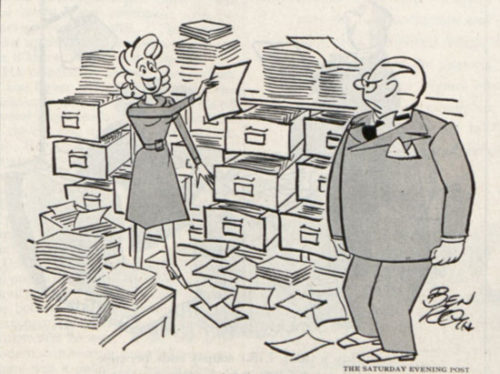
Ben Roth
January 3, 1948
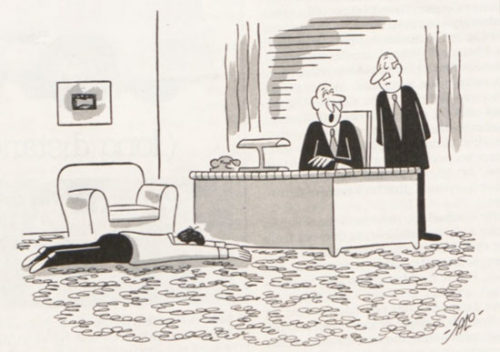
December 29, 1956
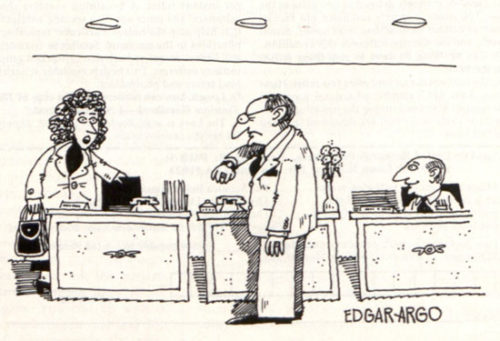
Edgar Argo
January 1, 2000
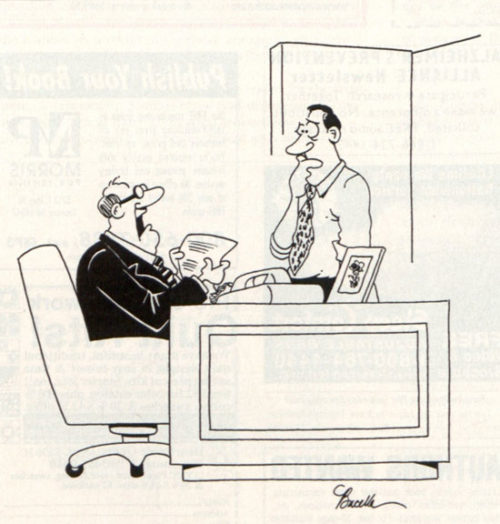
Bacella
March 1, 2003
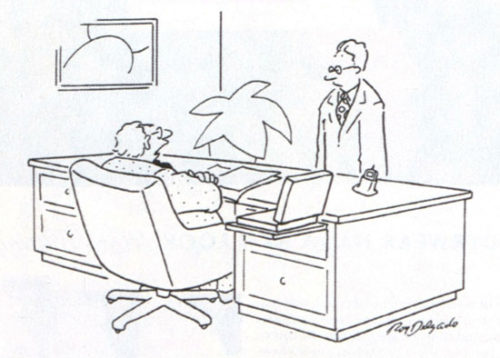
Roy Delgado
July 1, 2007
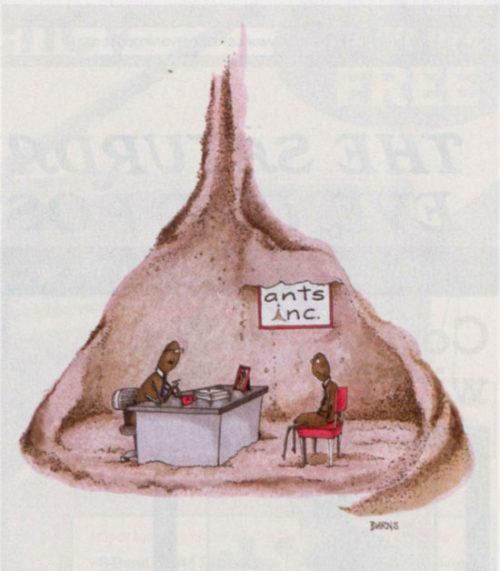
Burns
May 1, 2010
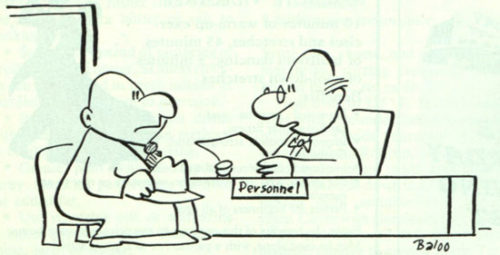
Baloo
January 1, 1989
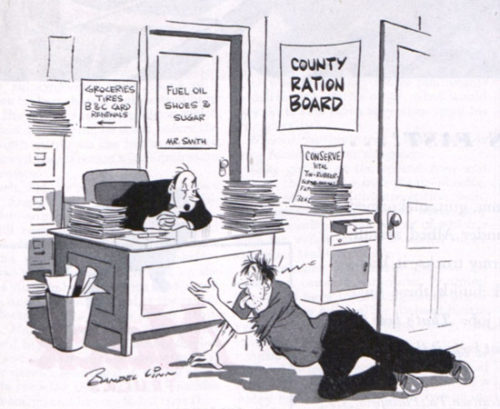
December 11, 1943
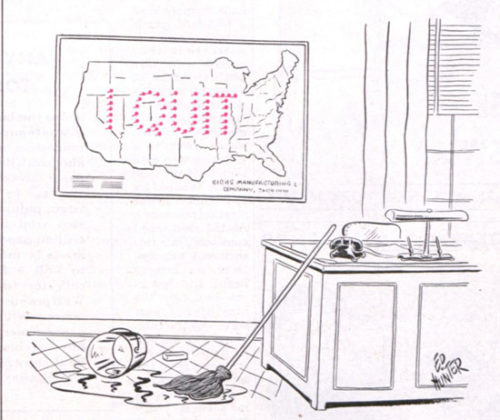
December 25, 1943
8 Most Embarrassing Presidential Gaffes
Today, everything an American president says is dissected and analyzed. For anyone under such scrutiny, gaffes are inevitable, and every thoughtless, off-hand comment or tasteless remark is captured and broadcast even before the president realizes what he just said. But all such gaffes are not equally horrid.
Here is a list of the eight most regrettable utterances from the highest office.
1. No Crooks Here
Asked in an interview if there were any situation in which the president, in the best interest of America, could commit an illegal act, Richard Nixon replied, “Well, when the president does it, that means that it is not illegal.” In hindsight, he was a little off on that one.
2. What Cold War?
Debating Jimmy Carter in 1976, Gerald Ford declared, “There is no Soviet domination of Eastern Europe.” Asked if he truly meant that the nations held behind the USSR’s Iron Curtain weren’t dominated by Soviets, he repeated himself, asserting that Poland, Romania, and Yugoslavia were free of Soviet interference. It destroyed all of Ford’s credibility in foreign affairs.
3. Unsound Check
Prior to a 1984 radio broadcast, Ronald Reagan was asked to speak into the microphone for a sound check. Joking, he said, “My fellow Americans, I’m pleased to tell you today that I’ve signed legislation that will outlaw Russia forever. We begin bombing in five minutes.” A recording of his statement was leaked, and Soviet forces were briefly put on alert.
4. Language Tango
In 1998 testimony before a grand jury, Bill Clinton was questioned about his improper relationship with White House aide Monica Lewinsky. In defending as truthful his statement that “there’s nothing going on between us,” he responded, “It depends on what the meaning of the word is is. If the — if he — if is means ‘is and never has been,’ that is not — that is one thing. If it means ‘there is none,’ that was a completely true statement. … Now, if someone had asked me on that day, are you having any kind of sexual relations with Ms. Lewinsky, that is, asked me a question in the present tense, I would have said no. And it would have been completely true.” His attempt at hair-splitting did not prevent his later impeachment by the House of Representatives.
5. Whose Finger Is on the Button?
Harry Truman, who liked to express himself in terse, direct statements, was asked whether the U.S. would consider using atomic weapons against the Chinese in Korea. He replied, “The military commander in the field will have charge of the use of weapons, as he always has.” Unfortunately, the commander was the impulsive, headstrong General Douglas MacArthur. Many Americans feared the General would start the next world war through the use of atomic bombs. The administration quickly issued a correction, but it didn’t erase the worries.
6. Bad Lip Reading
At the 1988 Republican Convention, candidate George H.W. Bush pledged to resist Congressional pressure to raise taxes. “They’ll push, and I’ll say no, and they’ll push again, and I’ll say, to them, ‘Read my lips: no new taxes.’” Two years later, those lips had to eat those words as Bush raised taxes, helping to drop his approval rating from 79% to 56%.
7. You’re on Candid Camera
A reporter once asked Dwight Eisenhower what important decisions his vice president, Richard Nixon, had helped him make. Eisenhower, with uncharacteristic candor, replied, “If you give me a week I might think of one.” It was such a revealing remark that the Democrats replayed it in campaign ads against Nixon in 1960.
8. Gutter Ball
On The Tonight Show with Jay Leno, Barack Obama was asked about a recent bowling event. “I bowled a 129,” he replied. Leno replied sarcastically, “That’s very good, Mr. President.” And the president added, “It’s like the Special Olympics or something.” Even before the taped show could be aired, the White House recognized the insult to participants in the Special Olympics, and campaign of apologies began.
Featured image: Rcihard Nixon (Photo by Ollie Atkins, National Archives)
3 Questions for Carol Burnett
Carol Burnett is still standing after all those pratfalls. And she’s working on a pilot for a new ABC sitcom. Hollywood is welcoming her back to TV.
There are lots of giggles in her latest book, In Such Good Company: Eleven Years of Laughter, Mayhem and Fun in the Sandbox (Crown Archetype). Serious moments too: “Sadly, variety shows have gone the way of the dodo bird,” she writes. “A variety show today can never do what we did. Why? Money. The cost of clearing the songs would sink the Titanic. Sixty to seventy costumes a week? No way. A 28-piece orchestra? Major guest stars? … Dream on.”
Carol confessed that she always adored chasing after belly laughs. That “best medicine,” as she calls it, got her fame and love and served her well in sad times.
Jeanne Wolf: In your book, you describe how your mother lived down the hall and you hardly ever saw your dad. When you look back, was there a lot of pain?
Carol Burnett: Yes, but Nanny [her grandmother] was my rock. In her eyes I was the number-one person in her world, so I felt safe with her. Even though my dad was an alcoholic, he was never abusive. He was just useless. The greatest pain I ever had came after he had been on the wagon because his mother had leukemia and asked him to stop drinking. That period was joyful. Then she died and Daddy showed up at the apartment, and he was weaving. He said, “I’ve just had one little beer,” and he passed out. I got so angry. I said, “I hate you! You said as long as I prayed for you, you’d never drink again!”
JW: Did your mom or your dad ever get to see you after you became such a success in New York?
CB: No, but Nanny saw me a couple of times on Broadway and TV. Our apartment was in Hollywood, and Nanny knew all the extras in the movies because they hung out in our neighborhood. When I was already doing well, she had a mild heart attack. So she’s in the hospital and there’s this line of extras in costumes lined up at her door to cheer her up. There was a man with a harmonica playing while his daughter, wearing a tutu, was doing a tap dance, twirling a baton, and ending in a split! Once she finished, Nanny said, “Well, thank you very much, I’ll tell Carol about you. Send in the next one.” It was like she was auditioning them.
JW: What fuels your terrific optimism?
CB: I lost my daughter Carrie 14 years ago to cancer. When she was in the hospital lying in pain, bald from the chemo, one of the nurses stopped me and said,
“I have to talk to you about your daughter. She is such an upper. We go in there in the morning, and if I have a long face, she cheers me up.” So I asked her, “Carrie, how come you’re always so up and cheerful despite all of this?” Carrie said, “Every day I wake up and decide today I’m going to love my life.” The key word is decide. That was her mantra. When I wake up in the morning, I say that to myself. It doesn’t always work, but for the most part, I am one fortunate person and I am gonna love my life to the very end.
—Jeanne Wolf is the Post’s West Coast editor
Oscar Winner Simone Signoret Defied Hollywood Ageism: 50 Years Ago
Fifty years ago, the Post honored an unconventional actress, Simone Signoret.
At age 46 in 1967, Signoret didn’t fit the ideals of the classic Hollywood beauty. She had matured beyond her early, youthful roles in French cinema in the 1940s.
Signoret supported her entire family with her early film career. Her father, who was Jewish, had fled to England. If Nazi authorities had learned of her father’s heritage, she would likely have landed in a concentration camp instead of on the silver screen.
By 1944, she had worked her way up to the leading roles in several French films, but it was a long time before American filmmakers began casting her. By the mid-1960s, she was no longer the ingénue. “I got old the way that women who aren’t actresses grow old,” she said. But she kept her remarkable talent.
Hollywood acknowledged her talent, giving her an Academy Award in 1959 for her performance in Room at the Top. That same year, the 38-year-old actress played a romantic lead in the film Ship of Fools, which earned her another Oscar nomination.
In an industry that often relegates mature actresses to bit parts or cameo performances, she managed to remain an accomplished, respected actress up to her last on-screen appearance — her 72nd — in 1986.
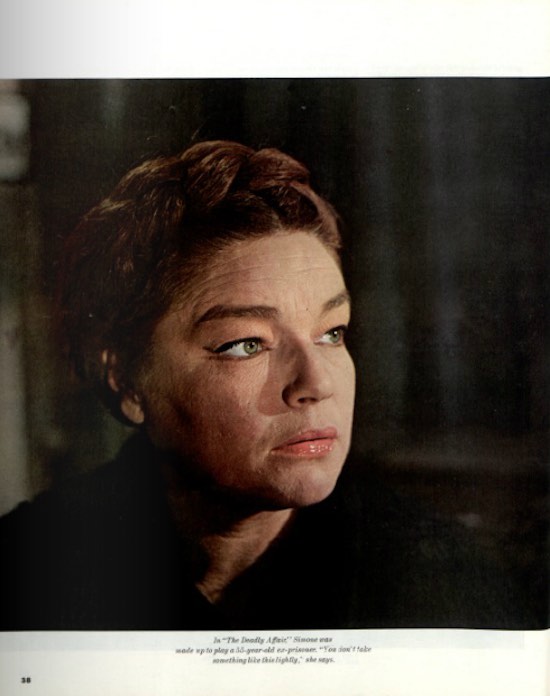
Cover Gallery: Let’s Go to the Movies
With the Academy Awards around the corner, we found some Post covers that make us want to grab a bucket of popcorn and watch a great flick!
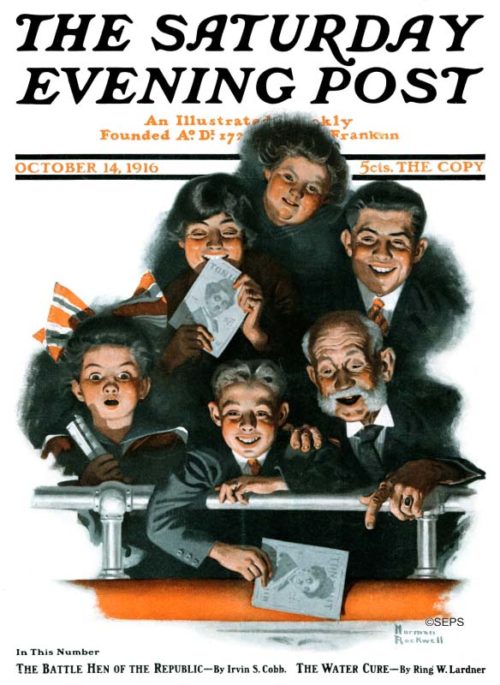
By Norman Rockwell
October 14, 1916
In 1916, Charlie Chaplin’s star was still rising rapidly. By 1916, at age 26, he was making $670,000 a year and in charge of his own studio. He had already appeared in 50 films, including his most well-known, The Tramp.
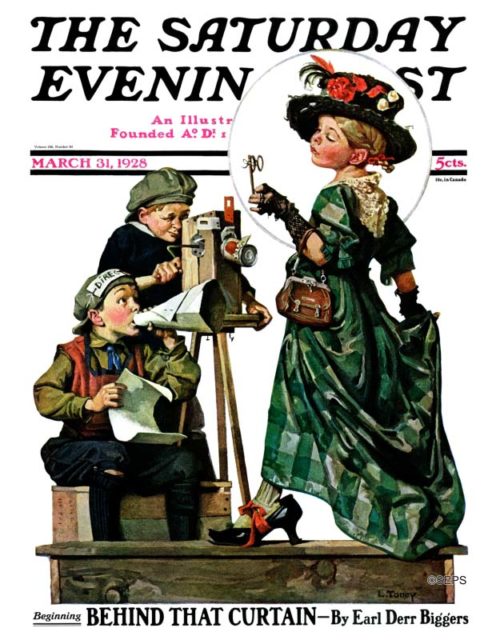
By Lawrence Toney
March 31, 1928
The movie bug has bitten these kids early – looks like we have a budding director, cinematographer, and actress in the making!
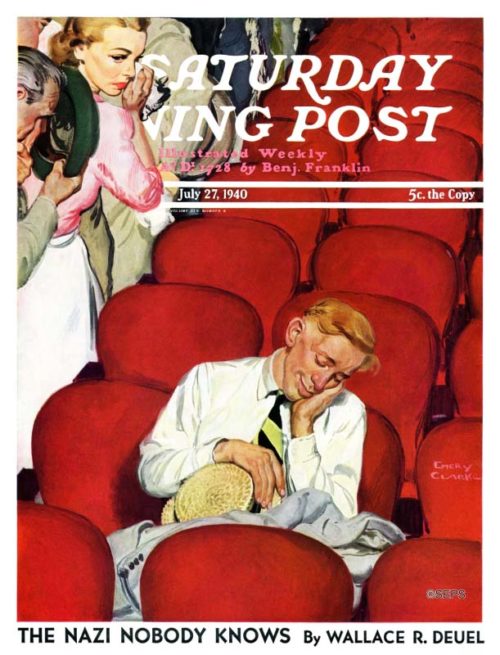
By Emery Clarke
July 27, 1940
He must have been watching Andy Warhol’s Empire.
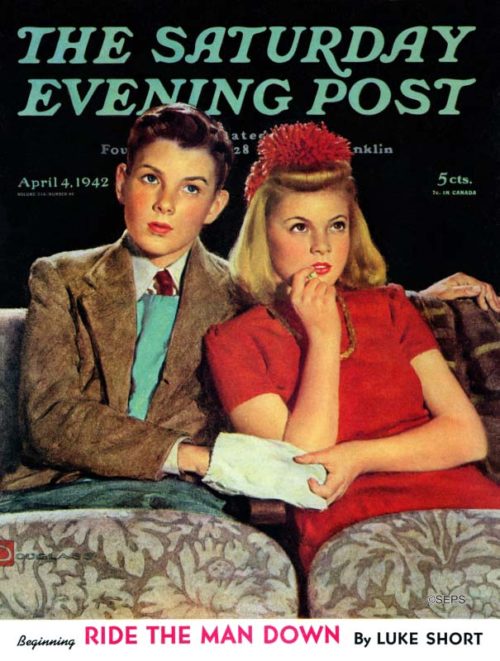
By Douglas Crockwell
April 4, 1942
Bags of popcorn have gotten larger and hair bows have gotten smaller since 1942.
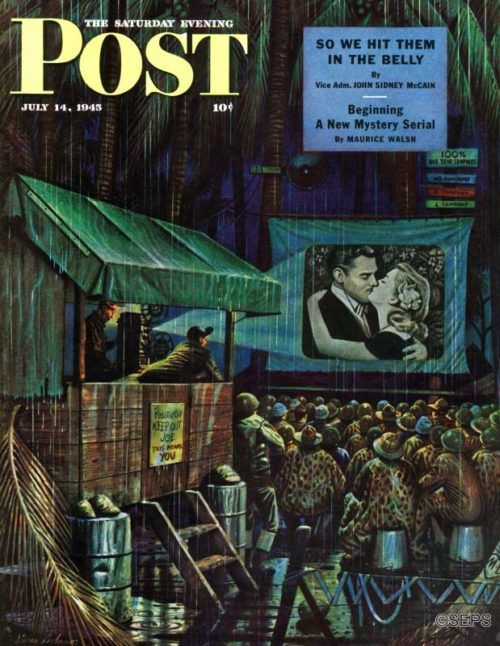
Stevan Dohanos
July 14, 1945
You can’t go wrong with a good romance, even in less-than-ideal circumstances.
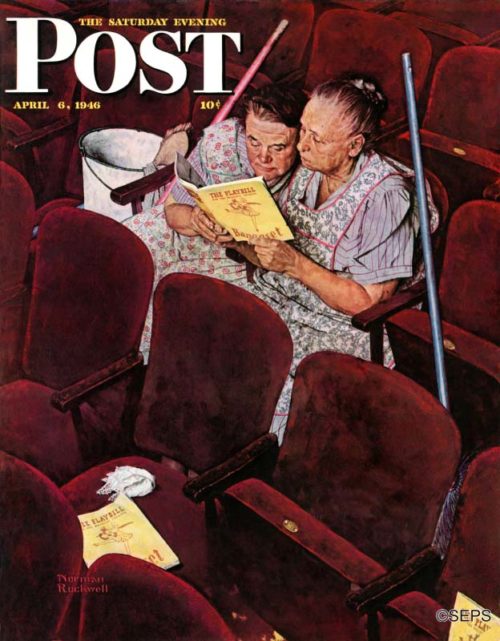
By Norman Rockwell
April 6, 1946
These cleaning ladies are at the theater, not the movies, but we couldn’t resist including this classic Rockwell illustration.
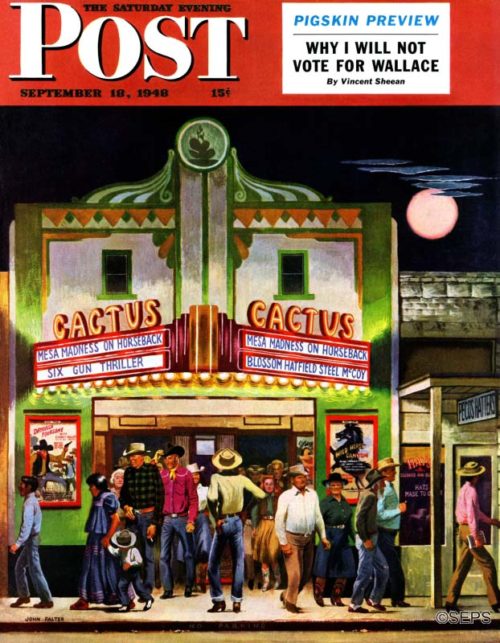
John Falter
September 18, 1948
Illustrator John Falter grew up in the Midwest and started his career in New York, and most of his paintings depict these locations. This southwestern movie theater is an outlier, but reflected Falter’s later interest in western art.
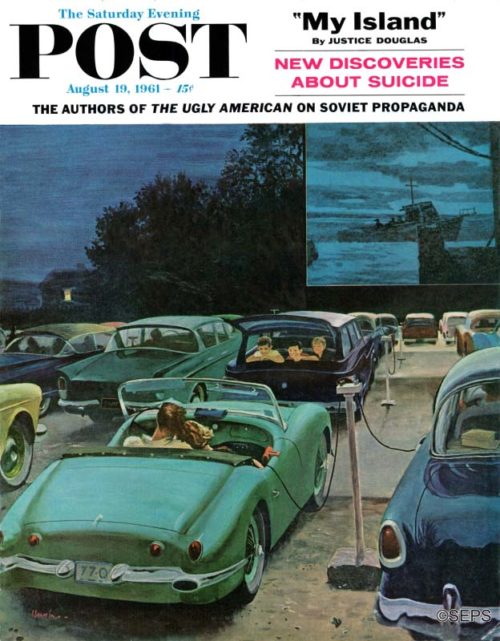
By George Hughes
August 19, 1961
Riding in the “way-back” of your parents’ station wagon has gone the way of the dodo, but you can still find a few drive-in movie theaters here and there.
Will La La Land be the Star of the Oscars?
The throwback musical hit starring cinema darlings Emma Stone and Ryan Gosling appears to be heading towards a triumphant night at the Academy Awards. With 14 nominations — a record shared with Titanic and All About Eve — La La Land could be the first musical since 2002’s Chicago to dominate the Oscars.
In some respects, La La Land is as classic as musicals get: the film is ripe with romantic tropes from Hollywood’s Golden Age. Gosling and Stone’s contentious courtship is reminiscent of Singin’ in the Rain. Gosling’s Sebastian is even a struggling jazz musician akin to Debbie Reynolds’ aspiring Shakespearean actress, Kathy Seldon. Just as Gene Kelly playfully mocks Debbie Reynolds for jumping out of a cake at a Hollywood party, Emma Stone’s Mia ridicules Sebastian for his part in a cheesy ‘80s cover band. The song and dance of “A Lovely Night” involves Mia and Sebastian all but imitating Fred Astaire’s and Ginger Rogers’ “Isn’t This a Lovely Day (to be Caught in the Rain)” from 1935’s Top Hat. The fantastical finale of La La Land even borrows a plot twist (and a stylized Parisian set) from An American in Paris.
There is just one hitch in La La Land’s nostalgic potential: Gosling and Stone are no Fred Astaire and Ginger Rogers. In 1978, The Post wrote of Astaire and Rogers, “They were together in 10 movies. They could take a line of Gershwin and put it into braille so you feel it in your soles.” Fans of old-time Hollywood will note this modern-day L.A. musical displays roughly half the raw talent of triple threat performers from the early days.
When describing his favorite role (Jerry Travers in Top Hat), Fred Astaire explained, “Nearly all the other screen musicals had dealt with the backstage problems of their characters. But in Top Hat I played the part of a successful professional dancer whose problems of love and romance came entirely from his private life” (1948). In La La Land, Mia and Sebastian are each aspiring performers, but there is never a sense that either is more or less than a regular person regardless of the success they achieve. Their love story takes place in mostly domestic settings, and Mia finds her “big break” by “playing herself” at an audition.
Many have praised Gosling’s and Stone’s performances as “charming” and “relatable.” The impact of the duo’s chemistry onscreen is unquestionable, and perhaps the song and dance is only supplementary. The two romantic leads will compete in the top acting categories, after all.
Much of the charm in La La Land can be attributed to director Damien Chazelle. The dreamy world of the musical is realized with long, sweeping shots and colorful sets. He has done his Hollywood homework, and it shows. Chazelle wrote and directed Whiplash in 2014, another jazz-centric film about a college drummer with an abusive teacher. The success of Whiplash allowed Chazelle the freedom to pursue an original musical in La La Land. A remake or Broadway transfer is generally a safer bet with studios nowadays given their pre-existing fanbases.
For all the cheery escapism La La Land offers, it will likely compete with two weighty dramas for Best Picture, Manchester by the Sea and Moonlight. The Academy’s pick will be anyone’s guess. Jimmy Kimmel will host the ceremony on Sunday, February 26th, and the night is sure to deliver old Hollywood magic even though Jimmy Kimmel isn’t exactly Bob Hope.
Check out Oscar Winners Inspired by the Post and America Goes Out to the Movies.
“Hobohemia” by Sinclair Lewis
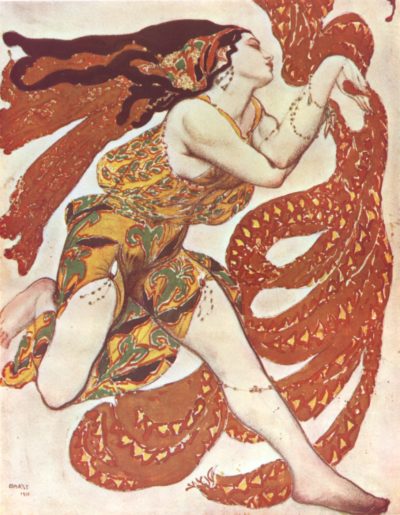 Originally published on April 7, 1917
Originally published on April 7, 1917
When Miss Elizabeth Robinson changed her first name to “Ysetta,” Mr. Brown knew that there was danger of her becoming incurably artistic. Mr. Dennis J. Brown lived with his widowed mother on Maple Hill, which is the guest-towel section of Northernapolis. Mr. Brown was thirty-seven — twelve years older than Ysetta. He was the general manager of the Inland Lumber and Construction Company. He talked quickly, and had a well-shaped nose, and wasn’t too bald, and sang a colorado-maduro barytone, and made eleven thousand dollars a year, and loved Elizabeth-Ysetta true. He had plans for a bungalow, with a vacuum cleaner and Ysetta as modern improvements.
But Ysetta’s plans were entirely different. She had Aspirations, and she was going to have a Career also, as soon as she could decide what to career about. She felt that it wasn’t respectable for one who was Different to be respectable. She tried to make Mr. Brown understand how Different she was; but he would stare at her delicate face, framed in an oval by coiled flaxen braids, and chuckle: “She’s a peach. She’ll make the dandiest wife in town, when she settles down and cuts out the Urges.”
For four years now Ysetta had had a new urge every season. The minute her family got back from the summer cottage at the lake she would catch an Urge. One winter she painted. The next she did interpretative dancing. Her demonstration of Esprit de Printemps, which is believed to mean The Spring Drive, was greatly applauded. It consisted of a foul, a bunt and a long slide for base. But Ysetta caught cold from wearing a dancing costume consisting of faith, hope and a good deal of charity, and she changed her Urge to being Economically Independent.
She borrowed eight hundred dollars from her father and Mr. Brown, and started Ye Precious Shoppe, where she sold tea, cakes, irregular jewelry, and orange tables with scarlet borders — that is, she really did sell some of the tea. She was so successful at being economically independent that she was only a thousand dollars in debt at the end of the season; but her father, who was a large red man with curvature of the waistcoat, grunted that she was a darn sight more independent than economical, and wound up the business.
Ysetta didn’t much mind, because she was coming to see that her Métier — a Métier is an Urge that you cash in on — was to deal in wares more subtle than tables, even orange-colored tables with bright red borders. She decided that she was going to deal in mystical and singing words, and reveal America to itself — in fact, run a Poetic Sightseeing Coach.
Mr. Brown encouraged her — when he had done a few calculations on the office adding machine, and estimated that for the cost of one quite small orange table Ysetta could get enough paper and ink to write two volumes of verse and one long novel. He gave her a box party at the best movie house in town to celebrate her inauguration as a genius. He pictured a future in which his clever wife, Ysetta, would come a-running, bringing a new poem along with his slippers in the evening. Chestnut eyes shining, she would cry:
“Dennis, I have written a poem to you, my hero!”
In intervals of selling laths and portable houses, Mr. Brown tried to keep up with the books she was reading. Now he could get private satisfaction out of the financial columns or the literary efforts of the biographers of Jess Willard and Fred Fulton, but he did not find much entertainment in An Analysis of the Sociological Factor in Realistic Fiction. He was a patient wooer, however, and he even permitted Ysetta to toll him to the Maple Hill Literary and Short Story Club.
The Short Story Club met in the charming residence of Mrs. Solomon Smoot, with its tufted leather chairs and prints of red-coated huntsmen. They were a jolly bunch, very modest and informal, despite the marked talent which had been discovered among them. There was the Reverend Justus Fliff. There was Mrs. Fliff, who wrote the sweetest little sunshine stories, one of which had been published in the Sunday News and had attracted attention all over the state — though you would never guess it, to see the deprecating way in which Mrs. Fliff replied to questions by the less successful writers. There was Nittie Smith, the child wonder, who at thirteen had written more than one hundred poems.
Besides these professional authors, Mr. Brown was introduced to some thirty intellectuals, all of whom showed remarkable promise.
It must be said for feminism that most of them were women.
Cowering behind the gilded pine cone portière, Mr. Brown discovered a large embarrassed male whom he had met at the country club.
“My Lord, what you doing here?” they said to each other, and shook hands desperately, just as Ysetta and the spouse of the large male bore down on them and dragged them out into the parlor, where thirty church-social chairs were arranged in rows.
Mrs. Fliff read a short story which she had written all by hand — she prefaced it by observing that the use of the typewriter explained the low level of style exhibited by the so-called popular writers of the day. She drew a long breath, tucked her hair back over her right ear, smiled nervously at her admiring friends, and read the story, “Dora of the Redwoods.”
It was a virile composition regarding a young woman who resided among the Sequoias, also among numerous handsome mountains and sunsets, but went to the city and got in wrong. The strong silent man back home, who had a heart of gold, even if he did not own a toothbrush, had been waiting for Dora all the time. He went up to the city and brought her back, presumably to tend the redwoods for the rest of her life. Mrs. Fluff gathered her daintily written pages of manuscript, rolled them and tied them with a blue ribbon, and begged:
“I didn’t know how terribly bad it was till I read it to all you terribly severe critics, and now I want you to tell me how terribly bad it is. I don’t want praise — I just want you to say frankly what you think.”
Mrs. Solomon Smoot confessed that “Dora of the Redwoods” reminded her of Stevenson, Jack London and Marie Corelli.
Mr. J. Edwin Bindle wondered if it wouldn’t be better to call it “Dora of the Redwood Forests.” He didn’t, he submitted, wish to be crankorious, and aside from this teeney-weeney point, it struck him as how the story was pos-so-lute-ly perfect. Everyone smiled; Mr. Bindle was so whimsical and original in the words he used. But everyone’s smile became uneasy as the authoress objected:
“Really, I should think you could see that my title is more crisp and powerful. I chose it as having that simplicity which is the brand new keynote in art. Please understand, I do want all possible adverse criticism, it is so helpful; but in this it does seem to me that you are most unjust.”
Everyone stared coldly at Mr. Bindle.
The librarian of the Maple Hill Branch asked Mrs. Fliff if she had submitted the story to the magazines. The librarian said that, from her long professional literary experience, she knew that any magazine would be glad to have it.
“Oh, I guess they wouldn’t care for it,” said Mrs. Fliff bravely, “though I must say that when I read the stupid hackneyed stuff that all these editors do print, I often think I just couldn’t help doing as well as that anyway! Now I want you good people to give me further frank criticism. ‘Tis only by correction, you know, that we can climb to fame and a wider usefulness.”
But it seemed that “Dora of the Redwoods” was one of those chaste gems in which no one, save a smart aleck like J. Edwin Bindle, could find a single fault. One club member pointed out that the dénouement was perfectly splendid, while another preferred the local color and heart interest, and a third moved that they give three rousing cheers for dear “Dora of the Redwoods.”
Mr. Brown, of the Inland Lumber Company, had been suffering in a manner suggestive of a person afflicted with neuralgia at an ice cream party. He had kept himself from saying anything by fingering a cigar in his upper waistcoat pocket till he had cracked the wrapper. Under cover of the cheer he leaned toward Ysetta and humbly inquired:
“Say, am I right? It strikes me that dear Dora is indescribably rotten.”
Ysetta stared.
“Why, no! Of course poor little Mrs. Fliff hasn’t had the opportunities that some of us have, but it’s a very sweet little story.”
“You’ll admit it’s hackneyed, and any fool could guess how it was coming out, and dear Dora is about as human as a crank case?”
“I suppose so.”
“And the story had all the pep of the McMac pages in the phone book, and Mrs. Fliff doesn’t know anything about redwoods — she’s got ‘em balled up with firs.”
“Still, it is a sweet little — ”
“I see. Otherwise it’s all right.”
“Of course it is!”
Ysetta seemed excited over all forms of optimistic fiction, from dear Dora to the charlotte russes which they later got as refreshments. Mr. Brown could not understand her exhilaration.
He did understand, a week after the club meeting, when he received a note from Ysetta informing him that she was going to New York to live. She was to take courses in English literature and fiction writing at Columbia University, and devote herself to the Life Beautiful. He was able to see her only once before she went, and then she was illusive and rather exasperating. She appeared to have been snatched up to a plane higher than his. Only when he took his hat and said despairingly, “I don’t suppose you’ll miss poor old Dennis at all in N.Y.,” did she come down to his level. She ran to him and put her hands on his shoulders. She let him kiss her once.
“Maybe I shall miss you there,” she murmured. “I’ll be such a little nobody in New York, among all those frightfully wonderful Bohemian people. And you are so staunch and good, even if you haven’t any artistic impulses.” She broke from him and skipped upstairs.
Mr. Brown retrieved his good new hat from the floor, rubbed it with his sleeve, put it on carefully, then remembered that he was a lorn lover and assumed a terrific aspect of hopelessness.
“I’ve got to lay in a supply of artistic impulses, then,” he said to himself. “It will raise hob with the lumber business, but I’ve got to come to it. Why not? Never saw the business deal yet I couldn’t pull off. Les-see. I guess I could learn poeting in a couple weeks.”
He went home rather thoughtfully. He took from his prim desk a bunch of discarded stationery. On the back of a letter headed “Lumber that Lasts. Inland Co. for Keeps,” he indited a small poem entitled “Thine Lips, Dear Love.”
He read it aloud.
“Gosh, that isn’t so bad!” he mused.
All next week he read a riming dictionary in the office. “The old man is up to something,” whispered the office force. “Can you beat it — him that always wears two-dollar neckwear coming out with one of those fluffy socialist ties? Betcha a hat he’s going out for amateur dramatics.”
To Miss Ysetta Robinson, in New York, Mr. Brown was writing long biweekly letters descriptive of the state of his business. Miss Ysetta, in short fortnightly letters, replied that New York was very large, and her instructors in college perfect dears, and had Mr. Brown read the latest novel? Mr. Brown never had. But he paid his secretary three a week extra to keep in touch with the bookstores, so that he might be able to write her such passionately intellectual phrases as, “Have you got hold of Gaston Rakowsky’s new novel yet? Tremendous! Never read anything more realistic than R’s description of the back room of a butcher shop.”
With a plaintive hope that Ysetta would approve, Mr. Brown joined the Short Story Club. When Mrs. Smoot, in her cunning way, tapped him on the arm and said: “Naughty, naughty mans! Oo haven’t written one bitsie story yet, and we all want to hear from you so much!” then Mr. Brown understood the pleasures of frightfulness. But he sneaked out for a smoke, and was able to hang on and write Ysetta full details about her admired friends, Mrs. Fliff and Mrs. Smoot and J. Edwin Bindle.
Ysetta never commented on his tidings about the Sapphos and George M. Cohans of Maple Hill. Her letters grew more infrequent. At last, when he asked about her return to Northernapolis, she broke out with one long letter.
She hoped that she would never see the provincial hole again till she was an independent and famous woman, she wrote. Her finer self had been bound by tradition and bourgeois ignorance, in Northernapolis. And at last she had been in Hobohemia.
Hobohemia is the place and state of being talented and free. It is to be found adjacent to the bar of the Café Liberté. In Hobohemia, Ysetta had seen several women drinking ojen cocktails, and heard a man in a sky-blue shirt with a soft collar say that he was an anarchist. She had been introduced to an actor in the Hobohemian Players, and to Max Pincus, the celebrated landscapist, and to Mrs. Saffron, the radical leader; and with her own eyes she had seen Jandorff Fish, the novelist, eating hors d’oeuvres.
Then Mr. Brown realized that it was useless to implore Ysetta to come back. If he ordered hors d’oeuvres in any restaurant in Northernapolis, the waiter would bring a Swiss cheese sandwich. The only thing Mr. Brown could do was to go to New York and become hors d’oeuvry.
He took a three-months leave of the Inland Lumber Company. He estimated that three months would be enough for a man who believed in card catalogues, instead of ojen cocktails and sky-blue shirts, to succeed in literature.
II
Upon the eastbound train Mr. Brown sat in his compartment and wrote short stories. Whenever he found them getting interesting to himself, he decided that they probably were lowbrow, and tore them up and took a fresh start.
Mr. Brown had been in New York before. He knew it as two hotels, seven theaters, six cabarets, three offices, a lumberyard and a subway. He went airily to the Grand Royal Hotel and telephoned to Ysetta.
She did not sound particularly welcoming as she demanded:
“What are you doing here?”
“Just got in sminit. I’m here on business. May be kept in the city for some weeks, working up some deals.”
“Deals! This isn’t the city of deals! It’s the city of the strong red wine of life.”
“Yeh, I know, honey,” he humbly agreed. “I’m going to shoot a beaker of that myself, as soon as I get out of this hot phone booth. But say, Bess — Ysetta — whatcha doing tonight? Can I take you out to dinner?”
“No, not possibly tonight. But you may come up tomorrow afternoon, and I’ll give you some tea.”
Did Mr. Brown spend his first evening in wandering solitary about the streets? No, Mr. Brown did not. Mr. Brown telephoned to the chief lumber jobber in New York, arranged for an introduction to the managing editor of the Morning Chronicle, and dined cheerful at the Hotel Gorgonzola y Vino, which is so expensive that patrons try to slip by the hat boy without claiming their coats at all. He attended the new musical review, Can You Beat It, Bo? and applauded, not like a soul recently called to the finer life, but like a buyer who had come on without The Wife.
At midnight, very pink and cheerful and brisk, with a carnation in his buttonhole and a stick swinging, all as glossy and luxurious as the orange back of a new ten dollar bill, Mr. Brown arrived at the office of the Morning Chronicle, and talked to the managing editor for ten minutes. He wanted, he said, to hire a good press agent, and a man who could think up plots for stories but was too lazy to write them.
For the publicity, the editor suggested Bill Hupp, who had been press agent for the Vampire Film Company till the recent consolidation. As to plots, there was Oliver Jasselby, who was always so exhausted by telling what genius his plots showed that he never wrote a thing, and had to hold down a job on the Plumbers’ Gazette.
At seven in the morning, Mr. Brown rose to lead the life literary, and get it over. He telephoned to Bill Hupp and Oliver Jasselby to come to his hotel at nine. He hustled out, and before the real estate offices were open he had routed out the superintendents of three buildings, examined seven offices, and engaged one. He dashed by taxi to a shop on Third Avenue which rents secondhand office equipment, and hired desks, chairs, rugs and a dictation machine. He bought carbon paper, typewriter ribbons, boxes of paper.
At nine he was prancing up and down his hotel room, planning a poem. Bill Hupp, the press agent, was announced at nine-one.
Mr. Hupp was built on the general lines of a motor van. He loomed into the room, glanced at Mr. Brown, chucked his yellow chamois gloves and fur coat on the bed, cocked his long ivory cigarette holder NW by N, two points N, and boomed “Well, what’s the sordid task? What am I to perpetrate on the public prints? Nice line about having organized a League for the Prevention of Cruelty to the Heathen, or just plain case of breaking into society?”
“Neither. I want to be a literary genius.”
“My Gawd, you don’t want me. I can’t help you. I’m a press agent, not a bartender.”
“Sure. I savvy. I guess the game is bunk. But I’ve got a girl who is artistic, and I got to follow suit, see? Me, I’m a lumber merchant. I never wrote anything in my life but ads and letters.”
“Got ye. We’ll put you across. I’m engaged. Salary, one hundred a week, and all we can drag down from the padded expense account. Name’s Bill Hupp.”
“All right. Now I want you to put me on to the very latest styles in literature. I don’t want to waste time on anything that isn’t dead highbrow.”
“Sure. Well, first, there’s this vers libre.”
“Huh?”
“Why, vers libre — free verse — so called because it doesn’t pay. It’s choppy stuff with no rimes or rhythm. Walt Whitman in kid gloves. You’ve seen it — this kind of poetry that you wouldn’t know it was poetry if it wasn’t printed that way. Then there’s these one-act plays for little theaters, like the Hobohemian Players. The plays have either got to be gruesome — cheery little jamborees, like a murder in a morgue — or else highbrow kidding stuff taking off all the playwright’s friends down in Greenwich Village. Third, there’s Russian realistic novels. That’s all.”
“Fine, Bill. Here’s your first week’s salary. Say, can you buy me about twenty-five dollars’ worth of samples of all this stuff, so we can model our own lines after them?”
“Right, boss.”
Oliver Jasselby did not float in till ten. Mr. Jasselby, the plot-hound, was a small little man with sandy hair and eyeglasses on a silk ribbon. He bubbled and squeaked when he talked. He agreed to deliver weekly at the office the following raw materials: One novel plot, four short story plots, six ideas for vers libre, and one outline for a morbid play.
When Bill Hupp returned with a consignment of the latest novelties in high art, Mr. Brown and he planned the first publicity. Bill suggested that Mr. Brown’s first name be temporarily changed from Dennis to Denis. The newspapers were to be permitted to run modest notes to the effect that Denis Brown, the distinguished California poet and dramatist, had come to New York to live. Not that Mr. Brown did come from California, but California is a good safe place for geniuses, climate and election returns to come from.
When Bill had gone off to supervise the furnishing of their new office Mr. Brown waded into the sample literature. By twelve, he believed that he had mastered the mechanism of the three forms of art.
He saw that vers libre was exactly like advertising, except that usually it was not so well done. The rules were the same — short snappy stuff, breaking away from old phrases, getting a unified impression. Now Mr. Brown had written advertisements. He remembered his masterpiece: “Who, is the bugaboo man who flags you every time you dream of the Little Cottage for Two? It’s your local builder! Let us bully him for you, soz you’ll get what you want, old top! Buy an Inland Portable Bungalow — you can clamp your eyes on it first, and know you’re getting what you wanta get — not what Mr. Local Builder thinks you think you want. Then it’s ho! for the Little House o’ Dreams among the trees, with You and Her sitting out on the 10 by 22 porch in the good old twilight dreamtime.”
When he had completed this advertisement, two years before, Mr. Brown had been rendered violently ill by it. But it really had sold bungalows, and now he perceived that it had in it most of the essentials of these poems about colors and twilight and mist and young women.
As regards the little plays for little theaters, he decided that they were exactly like smoking-car stories, related with gestures and snickers — except, perhaps, that the smoking-car stories were more moral.
And the final gasp in recent art, the Russian realistic novels, resembled the detailed reports on lumber-tract conditions which Mr. Brown had made for lumber companies in his early days. There was the same serious attention to dull details, the same heaviness of style, and the same pessimism about the writer’s salary.
Mr. Brown chortled.
“It’s just as I guessed. The reason why these guys get away with literature is because no business man has taken the trouble to go in and buck them. Oh, it’s a shame to take the money.” He telephoned to Bill Hupp, at the office. “Say, Bill, if you don’t mind, will you start sneaking in some press stuff about a Russian realistic novelist named Zuprushin?”
“Who’s he?”
“He ain’t yet. But he will be.”
“Then how do I get any dope about him?”
“He’s planning to come over here. His novels are being translated into English. He’s an immoral old hound. Primeval brute. His latest novel is a cheery thing called Dementia.”
“I get him. But what’s the idea?”
“We’ll write his novels for him. Bill, you listen to me: Inside of two months we’ll have every highbrow in New York talking about Zuprushin. From what you tell me, these New York littery gents don’t have time to read any of these foreign authors — they’re too busy talking about them. They don’t even buy the books. That’s done by the nice little old maids that overhear the talk. So the highbrows won’t dare to let on they haven’t heard of any new literary joker, and once we familiarize them with Brer Zuprushin’s name, they’ll all talk about him.”
“Yes, but say, boss — Hello! Hello! Get — off — the — wire — willyuh, operator! But say, boss, what’s the use of creating this Cossack cockroach?”
“Why, when he’s going big I’ll tell my girl I invented him, and she’ll know I’m the family genius.”
“Gotcha.”
Mr. Brown went out, humming. In four hours and a half he had made a scholarly study of all literature, created the poet-dramatist Denis Brown, and gently guided that unfortunate child of genius, Zuprushin, through his boyhood, studenthood, and the writing of his novel Dementia. For a person who had not been a literary gentleman till seven o’clock that morning, Mr. Brown felt that he was not doing badly, and he was whistling loudly when he arrived at Ysetta’s flat for tea.
III
Ysetta’s flat, on Morningside Heights, was a somewhat arty abode. There were curtains and a couch cover of gunny sacking, seven brass jars which held nothing in particular, candles which lighted nothing at all, and a near-silver percolator which was out of order.
Ysetta received him with marked calm. “So you are here!” she surmised by way of greeting.
“Me? Where? Why no; I can’t be here, can I, honey? Why, I’m just a little old bourgeois from Northernapolis.”
“Please don’t be so boisterous, Dennis. I suppose you are finding your business trip very amusing.”
“I’ll tell you about that later. First, you’ll want to know the news about Mrs. Fliff and Mrs. Smoot and Mr. — ”
“No, I can’t say I do!”
“Huh?”
“Poor earnest souls — it’s amusing to think of them trying to write.”
“Why, gee whiz, Ysetta, I thought you said they were such ink-pitchers?”
“Did I? Would you like lemon or cream in your tea?”
Mr. Dennis Brown had been thinking up a neat line on the subway, and he had his cue. He looked her over cynically. He smiled and pinched his lips.
Ysetta frowned, and roused from her Olympian ennui to demand: “What is it you find so amusing?”
“You, my child. It tickles me to hear all you highbrows use the word ‘amusing’ for everything from Mrs. Fliff to yellow vases with black spots.”
“How amus — How pleasant it must be to be tickled,” she sniffed.
But she didn’t seem quite so sure of herself.
“The other thing is: I wonder how you can be so banal as to say ‘lemon or cream in your tea?’ I suppose that at the present second more than forty thousand poor bourgeois females are saying just that.”
Ysetta completely forgot her superior attitude, and yelped “Oh, you do, do you!” in a manner which recalled the days when young Dennis Brown had pulled the hair of the little girl, Elizabeth Robinson.
“Yes, I’m sorry for you. But, of course, with this frightful handicap of coming from west of Chicago, you couldn’t expect — ”
“Then you may be pleased to know, my dear Mr. Brown, that I have had a vers libre — if you know what that is! — accepted by Direct Action, the one big, bold, free magazine in America!”
“That’s bully! It happens that I have just had a vers libre accepted by Direct Action, also!”
“I don’t think it’s very nice of you to joke about it. I think you might congratulate me.”
Ysetta spoke plaintively. Again there was more than a hint of the little girl from Northernapolis.
“No, seriously, hon, I mean it. You see, the deals that brought me to New York aren’t deals in lumber, but in ideas! Since you left Northernapolis I have felt the call of literature, too, and I have come here to learn. Humbly. Though I must say that the editor of Direct Action swore my poem was the finest he had ever seen.”
“Hon-est-lee? Oh, what is its title?”
“ Its — Oh! Oh, I see; you want to know its title.”
“Yes.”
“Why — uh — why, its title is ‘The Color of Thought.’”
“Why, that’s a wonderful title! Oh, Dennis dear, I can’t tell you how excited I am that you have seen how heavenly New York is. I’m still bewildered by it, but I’m so glad! Come down and hear the Hobohemian Players with me tonight, and meet Mrs. Saffron.”
“Hoozis? Mrs. Saffron that writes all this Woman-Can-the-Shekels — I mean Shackles — stuff?”
“Yes. She is the leader of the fight for woman’s freedom. And such fire! Such wit!”
“Gladmeeter.”
“Come for me at seven. And now tell me about those funny pathetic old hexes at the Short Story Club. I wonder if I ever told you about a terribly amusing story called “Dora of the Redwoods” that Mrs. Fliff wrote? I’ll never forget it. Even you would have writhed over it.”
“Yes, maybe I would,” he said a little wearily.
He perceived that he was going to have something of a task in keeping pace with Ysetta in his new occupation of forgetting that there was such a place as Northernapolis, where the benighted people did their work and went home at night to play with the kids, instead of leading the life literary. But he escaped without committing that worst of social errors — saying what he thought.
Between five and seven he had to have “The Color of Thought” accepted by Direct Action. Also, incidentally, he had to have the same written. For he had not exactly lied about the poem, he had merely sold short.
He sat down on the steps of Ysetta’s apartment house and did a job of thinking. It may be that his thoughts did not have the fire and glory which fill the meditations of all regular licensed public authors, but he did get down to business.
He had chosen the title because he had noted that color was a favorite theme in vers libre. Now he had to get some attractive new hues. He dashed to the subway news stand and bought a fashion magazine. On the subway he read the descriptions of new gowns, and encountered the color words “taupe” and “beige.” Mr. Brown did not know whether taupe was a watery pea-green, or a pink resembling the ears of a rabbit, and he did not care. On the margins of the magazine he wrote his poem. Between the subway and his hotel he stopped in at a jewelry shop and inquired for the name of a gem “that most people don’t know much about.” The clerk suggested “chrysoprase.” With that word Mr. Brown filled a space in one line of his poem. At the hotel he hastily dictated the poem to a stenographer. The completed product was as follows:
THE COLOR OF THOUGHT
Red that is blood —
Blue, soggy with the sky —
Green of the hackneyed spring —
Me, I hate these raw old colors, and I hate
White of dull purity,
But!
Taupe and the mystery of beige,
Colors inarticulate, moving, twisting, blind,
And color of a seadrowned chrysoprase —
These are the hues of thought,
Cruel,
Dread,
Power!
He expected to have to trace the editor of Direct Action from his office to some abode of rum and anarchism, but by telephone he found him at the office. He arrived there in seven minutes, two of which were spent in an impassioned debate between his taxi driver and a traffic cop.
He bounced into the office of Direct Action and beheld a young man writing at a small table which was so surrounded by piles of realistic novels, vegetarian pamphlets, pacifist manifestoes, bills advertising socialist dances, and suffrage banners, that it resembled a trawler in the midst of the British fleet. The young man looked up wearily.
“Brother, I want to see the editor.”
“Comrade, he is me. It’s after hours, but what can I do for you?”
“Shall I make Congress pass your bill, or shall I expose the governor, or do you merely want to sell me a story at three cents a word?”
“Brother, I suspect that you are a regular guy. It is none of them things. I would fain subscribe to your sheet, which I have never seen a copy of; and while you are recovering, I would still fainer get you to accept this poem in vers libre, and you don’t have to pay for it. I just want to see it printed. Honest, it isn’t as bad as some I’ve read.”
“Comrade, let’s gaze upon it — and hurry up with the introduction.”
“Brother, I don’t get you.”
“Why, the introduction; the spiel about your deep inner meaning in writing it — about its being vorticist verse, or a fugue in words, or whatever it is that distinguishes you from the ordinary apprentices.”
“Brother, there ain’t a darn thing that distinguishes me!”
The editor thrust the poem, unread, into a pigeonhole marked “Copy ready for printer.”
“In that case,” he said, “I accept it. Either it will be so good it’s worth printing, or so bad that my readers will think it’s some new brand of genius. Comrade, my name is Jerry McCabe, and when I gaze on your sprightly young face I suspect that you are a good guy. But don’t let that make you forget those dulcet murmurs about subscribing.”
Denis Brown, poet, arrived at Ysetta’s house only ten minutes late, which meant that he had to wait in the lower hall for twenty minutes. She appeared, in a clinging gown of green silk with a border of orange stenciling, and insisted:
“Dennis, you were joking about having a poem accepted by Direct Action! Why, I bet you can’t even tell the name of the editor!”
“Why, Jerry McCabe, of course! By the way, old Jer may be down at the Hobohemian Players tonight too.”
“Well, I don’t understand it. You only arrived in town yesterday,” said Ysetta with a restlessness not unnatural in one who has just been emancipated, and discovers that her home town has been sneaky enough to go and get emancipated also.
IV
They had dined at the Cunning Rabbit Tea Shop, Mr. Brown and Ysetta, and had witnessed four one-act plays presented by the Hobohemian Players.
Everybody in New York is always delivering something from some shackles, and the Hobohemian Players are an organization for delivering the stage from the shackles of the commercialized managers, and for developing a Native American Drama. Tonight the Players presented Native American Dramas translated from the Polish, the Siamese and the Esquimo, and one apologetic little curtain-raiser written in the United States.
Mr. Brown didn’t care much for the plays or the acting; and the audience, which kept telling itself between acts how superior it was to Broadway audiences, made him feel feeble; but aside from that, he enjoyed the show; and afterward he obediently tagged after Ysetta to meet Mrs. Saffron and her group at the Café Liberté.
Ysetta warned him:
“Now, Dennis, I want you to be careful what you say to these people — they are so clever and subtle and all — and don’t get off any of the noisy jokes you used to in Northernapolis. I’m as careful as can be what I say, till I’m admitted into their inner circle, and you — ”
As Ysetta expressed her timid admiration for Mrs. Saffron, her books on eugenics, and her participation in clothing strikes; for Max Pincus, the landscapist, Jandorff Fish and Gaston Rakowsky, the novelists, and Miss Abigail Manx, the anarchist queen, Mr. Brown became nervous.
With the feeling of a small boy on his first day at a new school, he followed Ysetta into the basement of the Café Liberté. It was only a fair-to-medium basement; Mr. Brown owned as good a basement himself, in the family mansion. It was painted a plain tan, and filled with chairs and tables that looked much like other chairs and tables. But the people were terrifying. When he could make out the individuals, through the confusion of talk that sounded like a phonograph factory next to a recreation park, Mr. Brown decided that Hobohemia was not going to be easy. There were large, bland, round-faced young men, with an air of inexpressible superciliousness. Two lads in evening clothes were being humble to a dismayingly pretty girl with bobbed hair, who laughed at them and made love to a stolid hulk of a man with a dark face, weedy blue-black hair, and a mustache so much like one whole live cat that it might at any moment have been expected to fly across the room and out of a window. Seven nonchalant and good-looking women were dining together, and they looked him over till he felt shredded. Behind them were babbling millions.
“Some bunch!” said Mr. Brown weakly.
“Oh, these are just imitations — society slummers, and artists that are as disgustingly respectable as though they were merchants. The real Greenwich Villagers always go in the next room.”
“Well, let’s stay here in the compression chamber a minute and get used to the air pressure before we try the real wild ones,” he begged, but she pushed through into an inner room. Round the table in the center were a dozen people, who bawled at her:
“Bonsoir, Ysette. Join us!”
Mr. Brown was conscious that they were all giving him what in less spiritual surroundings might have been called “the once-over.” He timorously sat down between Ysetta and a stern, smooth, tailor-made woman of thirty-five to forty. She was introduced to him as Mrs. Saffron.
Mr. Brown had expected Mrs. Saffron to be a wild-haired bouncer in a smock. He was rather uncomfortable in the presence of her mannish efficiency. A chinless redhaired young man dropped into the seat on the other side of Mrs. Saffron, and bawled at her in a raw prairie voice:
“How are you, honey? What you drinking?”
Mrs. Saffron turned her back on Mr. Brown, and he was left alone, a child in the dark. On one side of him Ysetta was talking to Max Pincus, the painter, a short, solid young man with a heavy and pasty face. Mr. Brown instantly developed a considerable degree of dislike for Mr. Pincus. who did not talk of landscapes but of Sex, with a capital S and four exclamation points after the word. In his rolling voice Mr. Pincus was assuring Ysetta that free love was the only possible life for a genius. Ysetta was attending meekly, and smiling — with the clear chestnut eyes that Mr. Brown loved — into Mr. Pincus’ glistening little eyes.
On the other side Mrs. Saffron was permitting the red-haired person to make violent love to her. She chuckled at him, and yawned “Oh, go home, you baby; you make me tired”; but she let him hold her hand and assure her that she was the only one in the world who encouraged him to keep up his artistic photography.
Jerry McCabe, the editor of Direct Action, came by and bent over to whisper to Mr. Brown: “I condole with you.”
“Say, McCabe, how do I get on the inside with this bunch of intellectual giants?”
“Make love to Mrs. Saffron. Watch Red. He does it badly and promiscuously, yet it suffices to keep him in the foreground.”
Two minutes after, when Red had departed, Mr. Brown leaned confidentially toward Mrs. Saffron and crooned just as though she were not a radical leader:
“Honey, I could slay our young friend for monopolizing you. Why do you think I came here? To see you!”
Mrs. Saffron didn’t seem in the least indignant.
“Well, you do see me, don’t you?” she replied affably.
Whereupon Mr. Brown forgot that he was to be modestly retiring, and with a high percentage of perjury informed Mrs. Saffron that she was fair to gaze upon and charming to talk to, that her revolutionary efforts were the one thing that inspired him in his poetry, that he wanted to buy her some more drinks and lots more cigarettes, and that he didn’t care a hang who saw them holding hands under the table.
Ysetta, who had been ignoring Mr. Brown, began to notice that he seemed to be able to get along with the lofty Mrs. Saffron. Then she discovered that the whole table listened to Mr. Brown when he told about the latest Russian novelist, Zuprushin, and his novel Dementia. She amazedly saw that Mrs. Saffron was urgently introducing her “nice boy,” Mr. Brown, to the other nice boys, Jandorff Fish and Gaston Rakowsky, who listened feverishly as Mr. Brown outlined the plot of Dementia, which, apparently, had recently been translated from Russian into French.
The unlettered business man demanded fiercely of the master novelist, Jandorff Fish — temporarily employed by an interior decorator:
“Why, surely you’ve heard of Zuprushin?”
“Certainly I have! In fact I have one of his books at home, in French, though I haven’t got to it yet.”
Abigail Manx, who had joined the bunch without invitation, declared:
“Of course Zuprushin is superior to any American writer, but he doesn’t compare with Artzibashef, or even Andreyeff.”
Max Pincus deserted Ysetta to get on the bandwagon.
“Nonsense, nonsense!” he roared. “Mr. — Your friend, Ysetta, iss right. Zuprushin is the ver’ latest manifestation of the somber Russian soul!”
“I told you so!” exclaimed Mr. Brown. “Look, Pincus: you’ve read your Zuprushin in the original, while the rest of us only know him in French. Don’t you think that Dementia is infinitely more — oh, you know.”
“Oh, yaas!”
“But Gray — Zuprushin’s new novel, Gray — the one that hasn’t been translated from the Russian yet — can you tell me about it?”
Though he was rather vague about the plot and characters of Gray, Mr. Max Pincus gave a discourse on its “vital motivation” which really did him credit, considering that Zuprushin was now only about twelve hours old.
When Mr. Pincus had turned again to Ysetta, and Jandorff Fish and Abigail Manx had sunk into a bitter wrangle as to the reason why there were no Zuprushins in poor sodden America, Mr. Brown went the verbal rounds of the rest of the table, and one by one he asked the yearners whether they were good little radicals and knew their Zuprushin. They did, oh, indeed they did!
Again Mr. Brown indicated to Mrs. Saffron that he was desirous of buying her a fresh box of cigarettes and a lot more drinks, that if they two could get rid of all these Little People they would stride across the mountains together, and that he cared less than ever who saw them holding hands. To which Mrs. Saffron listened with mockery and delight.
Max Pincus, fulfilling the onerous duties of genius, had to go over to another table and make love to some girls who had just come in. Ysetta was left stranded. She turned to Mr. Brown with more interest than he had seen for many months. But he paid no attention to her. He wanted her to be just a little jealous, and —
And he was surprised to find that he was actually enjoying making love to Mrs. Saffron. Although she devoured his compliments raw he was none too sure that she was not thoroughly on, and in the game of trying to find out what she thought he was not excited by Ysetta’s naïve tactics. When the Liberté closed for the night Mrs. Saffron was telling him the story of her life — at least one version of the story.
The Hobohemians stood unhappily on the sidewalk — exiles with no smoky place to go, though it was only one o’clock and the talk just beginning to get interesting.
“All of you come over to my place!” cried Mrs. Saffron.
“Shall I come?” Ysetta asked timidly.
“Oh, you — you most of all funny little child from the West!” purred Mrs. Saffron. But as she looked over Ysetta’s shoulder into the eyes of Mr. Brown her expression indicated that it wasn’t Ysetta she liked best of all.
Though the socks-trade strike and the Dakota mine strike had both been planned there, Mrs. Saffron’s flat was not exciting, except that pillows were used in place of chairs. The talk faltered. There were only eleven people there, instead of the jolly crowd at the Liberté, and they discussed scarcely any subjects except the war, sex, Zuprushin, Mr. Max Pincus’ paintings, birth control, eugenics, psychoanalysis, the Hobohemian Players, biological research, Nona Barnes’ new way of dressing her hair, sex, H. G. Wells, the lowness of the popular magazines, Zuprushin, Mr. Max Pincus’ poetry, and a few new aspects of sex. So the party broke up as early as two-thirty, and they all went home to get a good night’s sleep for a change.
Mrs. Saffron had invited Mr. Brown to come in for tea, and bring “your nice little friend, Ysetta.”
Ysetta had overheard this, and after a strained silence in the taxi on the way home, she observed:
“Dennis, do you know that you forced your attention on Mrs. Saffron to such an extent that one would almost have thought it was you that took me to the Liberté! And you promised to be so careful. What were you talking to her about anyway?”
“Oh, about Zuprushin.”
“Well. . . . Well, I must read some more Zuprushin too. . . . When I get the time. . . .”
“Sure.”
Mr. Brown grinned in the darkness. But he was in a turmoil, whereof these were the component parts:
Three hours of mixed drinks and cigarette smoke.
A feeling that Ysetta would have to be thoroughly spanked.
A feeling that he ought to feel that Mrs. Saffron was a crank, but —
A feeling that he would jolly well like to know whether she really liked him or was merely having a good time with him.
V
The office of the D. J. Brown Literary Productions Company, in the Knee Pants and Overalls Building, on aristocratic Fifth Avenue, was in full activity. Bill Hupp was busy with the telephone, getting little notes about Zuprushin and Denis Brown, the poet, into all sorts of publications, from the New York papers to the Zoölogical Quarterly Review. The stenographer was on the jump, with manuscript copying, and letters to editors. Oliver Jasselby arrived weekly with children of the brain which were to be incubated by the Productions Company. Mr. Brown supervised everything, and when he had time actually did some writing. In the morning he devoted himself to vers libre and one-act plays; in the afternoon he turned out short stories and a novel for M. Zuprushin.
The Zuprushin brand rapidly became their chief line of manufacture. The verse of Denis Brown didn’t sell very well, and it attracted no attention, while the readers for the Hobohemian Players and the Cockatoo Theater turned down all his plays. His name wasn’t foreign enough! But Zuprushin was so popular with the radical magazines that after the publication of his two stories, “The Faun of Folly,” and “Fog of the Samovar,” in Direct Action, his American agents, Messrs. Brown and Hupp, received dozens of letters from small but fiercely iconoclastic magazines asking for contributions.
There may be a wonder as to how Mr. Brown, of the Inland Lumber Company, could write the stories of M. Zuprushin of Moscow.
Efficiency, always efficiency.
First, he would secure a thoroughly disagreeable plot from Mr. Oliver Jasselby. Then he would think of the meanest possible character. He preferred a gentleman who was the descendant of a prince with paralysis and a gypsy with kleptomania. By preference the lad suffered from vodka, carcinoma, neurosis, Anglomania, vegetarianism, cocaine and artistic vision. He killed his baby sister because she insisted on playing with dolls, which he regarded as a weakness unworthy of the Great Russian Gloom. Whenever he gave the toast “The ladies, God bless ‘em!” he always made a slight change in the verb.
Mr. Brown would sit and brood about this hero till he hated him ferociously, then dictate a lucid but not necessarily polished account of him, occasionally referring to Mr. Jasselby’s plot for suggestions as to what the lively spalpeen could do next. As Mr. Brown’s knowledge of Russian daily life was comparatively slight, except for having once sold an old suit to a Russian Jew in Northernapolis — an incident which had caused him to distrust the whole Tartar race — he wisely laid the scenes of his stories in Northernapolis or New York.
He shipped the product in to Mr. Bill Hupp, who had once been on a newspaper copy-desk and was qualified to put in the adjectives, the spelling and the punctuation. Then it was routed to the latest member of the staff, Mr. Mischa Knippensky. Mr. Knippensky was a slender, sallow, bad-tempered young man who worked on a Russian weekly.
He inserted the Russian names and local color, and a few jolts of pessimism carefully culled from Pryzbyszewski, Artzibashef, and Dostoieffsky.
When the masterpiece left Mr. Brown’s own hands it would read thus:
“This fellow John Henry is sitting in his room and he looks out at the mist rising from Muskrat Creek and thinks the creek is getting low, the banks are so muddy, just then a Twin-Two car goes up Main Street past his window and turns onto Floral Avenue and stops in front of the Hartford Lunch. John Henry says, Gee, I don’t hardly know whether that is an automobile or my heart pounding, I got to stop smoking so much, now wouldn’t I look like a boob dying of smoker’s heart when I could get more publicity by croaking myself or pinching a horse and getting shot up by a deputy. I guess maybe I wouldn’t mind kicking off by biting J. Edwin Bindle and getting hung. Just then Gwendolyn De Vere trots into the room. ‘I made a getaway after all, she says, my mother is gassing with Mrs. Fliff, and I sneaked out on her.’
“John Henry kisses her, then remembers how she bores him. ‘I got to go down to the office and get out a form letter,’ he says, he grabs his top coat and just as he gets to the door she grabs his razor and cuts her wrist, it bleeds something fierce. ‘My Gosh, cries John Henry, I bet I get hung for this, probably I better commit suicide after all.’
“Memo: Bill: See what you can do along above line. It’s rotten, but you get the idea. Tell Knippensky to get in lots of the agony stuff here, and get the copy out of him before you pay another advance. D.J.B.”
After the joint efforts of Bill Hupp, Mischa Knippensky and the stenographer, the gay little paragraph would be transformed into the following:
“The room was crepuscular. A mist, vague, choking, chill as the tomb and inescapable as the burden of continued living, rose from the sluggish Neva. The hoofs of a horse racing down the Nevskii Prospekt echoed like the tick of a death-beetle. . . . Were they hoofs? Or his own heartbeats? He had been smoking too many cigarettes of Cairo, Ivan Nicholaievitch thought. He must stop smoking. . . . It would kill him else — him who was so proud, who had planned to die in some manner more dramatic, more fine and tender, than by too much smoking. . . . He forgot the sinister fingers of the fog as he treasured the superb ways in which he could die. . . . Lingering consumption, a duel, the barricades, hashish, suicide. . . . Yes, most of all, suicide. They would find his body . . . Corpse . . . Crushed, scarce recognizable . . . They would cry: ‘One of us, at least, has found something interesting to do, in this meaningless treadmill of life.’
“Polina rushed into the room. ‘I have come to you!’ she cried. ‘My husband sits sodden with a decanter of vodka before him. I gave him the vodka, the dear little father vodka.’ Ivan Nicholaievitch kissed her violently. ‘You are so strong, so brutal, so wonderful, Ivan Nicholaievitch,’ she said. He put on his caftan, started for the door. ‘Why do you leave me?’ she groaned. ‘You smother me,’ he said. ‘I was in the midst of a speculation which would have solved all the restless quest of this transitional age.’
“Polina took from the table his little pistol and quietly shot herself. He looked at her. ‘She really is dying,’ he marveled. Though that strange gentle soul of his was ruffled by her utter thoughtlessness, he added no word of blame. He sighed, ‘And it was such a little pistol. I would not have thought it would have killed her so dead. . . . It is time to go down to the barracks, and flay a soldier. To keep up discipline. . . . Is it not humorous that one should keep up discipline now, when the question that would console all noble beings for having to live is wavering in solution in my mind — hanging or suicide — a splendid hanging, under the fresh morning clouds, kicking at the banal sky in an ecstasy of torture — or suicide at midnight, alone, palsied by the funereal fog of Mother Neva?’ Ivan Nicholaievitch went sadly out and closed the door. . . . Polina bled a good deal, but presently she was dead. . . . Quite dead. . . . In the kitchen Genitchka could be heard shucking an onion and grumbling that the milk had curdled.”
VI
Though the tales of that grand old fake author, M. Zuprushin, revealing the somber hinterlands of the Slavonic temperament, issued from it, yet the office of the D. J. Brown Literary Productions Company was not scary, as ordinary readers of Zuprushin might have imagined. Mr. Brown and Bill Hupp worked at large roll top desks; they wore green eye shades and silk shirts and long cigars; they yelped excitedly “Landed an item in the Literary Review, Denny”; or, “Gosh, Bill, I got a humdinger of a detail for the hero of ‘Mute Madness.’ You know where he kills his grandmother? I’m going to have him chew a strand of her blood-stained hair and whisper ‘It tastes gritty.’ Class, what?”
Mr. Brown was used to the bustle of an office, to telephone bells and typewriters and the bang of elevator doors, and the activity of his new establishment was an inspiration to him. Whenever he desired to describe the vast solid silence of the steppes, he went out and listened to the stenographer pounding his machine and whistling The Honey-hu-hu Rag.
The stories of Zuprushin in the magazines, and the mention of his coming novel, Dementia, in the literary columns, were seriously received. Mr. Brown heard comments on them every time he went to the Café Liberté, to Mrs. Saffron’s or to Ysetta’s. He would in a very few weeks be able to tell Ysetta the truth, and take her back to Northernapolis without being spiritually henpecked.
There was only one trouble in regard to Zuprushin. He had no one theory of life which the Hobohemians could grasp and talk about. Something could be done along the line of feminism. You could always get a hearing in Hobohemia by discovering a new way of repeating that women were the equals of men. Then why not declare that women were the superiors?
You who daily hear of the theory of katanthropos will scarce believe it, but it originated in the mind of Mr. Brown, lumberman, and was fully developed by him after reading two articles on biology in the cyclopedia, and asking Mischa Knippensky, translator and scholar, for a couple of good snappy Greek words.
Katanthropos means that men are to women what drones are to the worker bees. It is derived from the Greek “kata,” meaning “down,” and “anthropos” meaning man — and as the two words together don’t mean anything in particular, they have enormously puzzled the college professors, who have explained the combination in nine-page articles ballasted with footnotes. I now reveal the truth, which is that “katanthropos” was Mr. Brown’s simple-hearted translation of “Down with the men.”
In two stories in Direct Action, Mr. Zuprushin used the word “katanthropos,” and in an article in Psycho he came out flatfooted and said what he thought about katanthropos. He pointed out that among the lower animals, though the males might be showier than the females, they were merely parasites; and he suggested, with that powerful irony of his, that in our own human experience men certainly are the most complete dubs that can be imagined, and, therefore, women must be better.
Aside from being old as the hills, and biologically incorrect, katanthropos was really a nice new theory. All of Hobohemia instantly began to talk about it. It almost wiped out psychoanalysis and sex inhibitions as the popular topics for discussion at the Liberté. Mr. Brown himself couldn’t keep up with the latest twists given to it. If he sat with Ysetta at a table for two at the Liberté Max Pincus would come darkly lumbering in, drag another chair up to their table, demand that Mr. Brown buy him a drink, make love to Ysetta, then plunge into a monologue on katanthropos.
Mr. Pincus didn’t exactly say so, but he let it be inferred that long before Zuprushin had been heard of in America he, Max, had met him in Little Russia and heard all about katanthropos from the lips of the Master — sure, Max called him “the Master.”
Mr. Brown was really impressed on the evening when Gaston Rakowsky informed the group that all of five years before he had talked over katanthropos with Herr Professor Dr. Hans Heinrich Wukadinovitch, of the University of Bonn.
Mr. Brown was grateful to them for helping him to lay the groundwork for a good paying. business. Meantime, he was getting into literary society. He found that all he had to do was to be around, and he would be invited to at least nine parties a week. Some agitated lady, with back hair that ought to have been subjected to universal training, was always getting up a studio party, and wildly looking for guests, and inviting whole tablefuls.
He found that he could not keep up with his literary social engagements. The Liberté group was only the beginning. There were at least three hundred distinct artistic groups in town.
There were crystal ball and table-tipping parties at large bare studios in uptown loft buildings; teas in duplex apartments near Central Park; anarchist songfests in cellars on Mulberry Street; “quaint” restaurants on Washington Square, where social workers and writers went for dinner; lunch clubs of young editors and writers and artists, who disapproved of the Liberté, and talked solemnly about the publishing business; dinner clubs composed of ex-soldiers of fortune who wrote tales of adventure; poker parties at which literary but raucous young men drank growlers of beer; a social set frequently attended by dowagers with lorgnons; and even a commuting literary set, which would invite you to weekends. All he had to do was to be at one party, and he was asked to nine others. So that the last state of that man became a lot worse than the first; and Mr. Brown’s notion of a real entertainment was to go home, play his own records on his own phonograph for half an hour and go to bed.
He met almost every well-known writer and artist in America — and the sight considerably saddened him. He got used to asking “Who’s that meechin’ jack rabbit of a man over there drinking tea with his chin and talking about his lumbago?” and hearing the horrified reply: “Why, that’s the most famous writer of cow-puncher stories in America!”
Sometime during these social explorations Mr. Brown discovered that Ysetta was becoming interested in him — and that he wasn’t quite sure that he was still in love with Ysetta. Ysetta had too much Northernapolis air in her system to get herself ever really to like the thick-lipped, blue-faced fervidness of Max Pincus. She was always a little bewildered at the Liberté. Once Mr. Brown became a favorite and an insider, she began to admire him. She assumed that they two had been comrades in the fight for Culture back in poor Northernapolis.
Mr. Brown should have been gratified. But, like every business man, he was excited by pushing through a deal; and now he was interested in the game of literary success for its own sake. At first he had gone to parties only to see Ysetta; now she was not present at half the gatherings he frequented, and he called her up for tea only once a week.
So she began to telephone him, to implore him to take her for walks in the country. She began to call him “Big brother” whenever there was moonlight, and to sigh contentedly if he held her hand. When he informed her that M. Zuprushin had read one of his free verses and had actually written to him — he showed her the letter, which was in Mischa Knippensky’s very best French — Ysetta almost kissed him. But he did not notice her intention. At that moment he was engaged in thinking “Time to beat it — due at Jane Saffron’s.”
For in the midst of his social rush he managed to see Mrs. Saffron at least three times a week. Whenever he thought Mrs. Saffron was in love with him, she would laugh at him; whenever he thought he bored her, Mrs. Saffron would whisper:
“Denny, dear, I need you near me this evening. These boys of twenty-five, with their theories, are so old. But you have the heart of eternal youth and daring. I suspect you of having been a gallant soldier.”
It is yet to be discovered that the firmest pacifist objects to being told that he has been mistaken for a gallant soldier, or that the most solid business man finds anything ridiculous in the statement that he has a heart of eternal youth. Mr. Brown could always be depended on for tea at Mrs. Saffron’s.
He may have dreamed of Ysetta’s pale pure face, framed in an oval by her corn-colored hair, but that does not imply that he still desired to be her private worm, ready to be trod upon at all hours. He was beginning to feel that he, too, was a person with a soul, and that he would free the same or bust something.
At which dangerous period in the history of Mr. Brown’s soul, was published Dementia, the first complete novel of Zuprushin.
VII
So far, Zuprushin’s message of Katanthropos and Gloom had been known only to the hardy thinkers of the cigarette belt. Now it was to be revealed to the whole hungry land. Dementia, by Serge Zuprushin, translated from the Russian by Mischa Knippensky, had been completed, accepted by a revolutionary publisher who had four times been pinched upon complaint of the Worchester Purity Society, and was now to be issued.
The newspaper world was prepared in advance. Mr. Brown and Bill Hupp had gone down to the East Side, picked out one Moe Witzig, a prophetic-looking Russian Jewish ol’ do’ man with a long black beard and an epileptic derby, kidnaped him, disinfected him, photographed him and released him in a state of wealth and bewilderment. Moe Witzig was a respectable kosher man who read nothing but Vorwaerts, and he might have been astonished to learn that in every newspaper and magazine art room in America was his picture, labeled “Serge Zuprushin, the most startlingly pessimistic of Russian novelists.”
Dementia, as published, wasn’t exciting to behold. It had a gray-blue cover, and a bilious frontispiece presenting a large unkind gentleman staring at a young woman in a painter’s smock. But the jacket was a striking thing in green and crimson, announcing that Dementia was not a book for children or old-fashioned moralists, but that it was “shot through and through with a brilliant and perilous genius.”
The advertisements also murmured modestly that it was shot through and through with this brilliant genius; and two weeks after publication, when the reviews began to come in, there was the strangest coincidence — one which shows the solidarity of thought in our land. Thirty-six out of fifty reviews asserted that while Dementia was not a book “for children or old-fashioned moralists” it certainly was shot through and through with that same kind of projectile.
In a month the real critical articles, by college professors, were appearing. Mr. Brown was slightly dazed to find out what a genius he must be. He was more dazed when he read a disquisition by James Jouse, the celebrated British novelist who had left England during the war because he felt that the British were becoming almost prejudiced against his friends the Germans. Mr. Jouse made a few scornful references to the poor American boobs who dared to criticize the titanic personality of Zuprushin, and told chattily about meeting Zuprushin in Paris. Zuprushin had said to him:
“Jim, you are the only one of the blooming Britishers who can understand my philosophy, and of course no American ever will.”
Mr. Brown was pleased to find that at the end of his article Mr. James Jouse let the public right in on a letter which Zuprushin had written to Mr. Jouse all of seven years ago, before America had even heard of Zuprushin.
“Gosh, that’s a fine letter,” sighed Mr. Brown. “I don’t know where I got that line about Tartar temperament, but it sure sounds good. I’ve been plumb wasted on the Inland Lumber Company, if I wrote a letter like that seven years back.”
Far beyond the reach of the novel itself was carried the theory of katanthropos. It became the favorite word of the hour. Vaudeville teams used it, and sob-squad newspaper women asked their readers to write in what they thought about it; cartoonists began to make fun of it — to spell it “catanthropos” was always knockdown humor; ministers denounced it; a Boston women’s club defended it; a prominent antisuffragist blamed it on the suffragists, and a suffragist on the antis. Katanthropos was an easy word — once you had learned to accent it on the an and to look superior while you said it — and millions added it to their vocabularies. If a teamster’s wife in South Bend wished to convey her impression that her husband was a drunken bum, she made a sound like “you old katanthropos,” in the belief that it was a new cuss word; and if a polo player at Coronado wanted to show off before a curly-headed debutante, there was no possible means of preventing him from being witty about katanthropos.
The Zuprushin vogue began to get away from its starters.
Hundreds of women, from twenty to fifty, wrote to M. Zuprushin, care of his publisher; and Mr. Brown and Mr. Bill Hupp were dismayed as they read that every one of these women had crushed souls, and that they were using Zuprushin and his theories as excuse for eating all the candy they wanted, or deserting their husbands, or refusing to wash dishes. Messrs. Brown and Hupp were reasonably strong for suffrage, but as the diabolical word katanthropos was fired at them in scented feminine notes they began to wish to take M. Zuprushin and beat him to death.
It was Ysetta herself who finally frightened Mr. Brown. He was under the impression that Ysetta was still in love with him, as she had been for all of five weeks. He was tired, one early evening. He wanted to be quiet. With a realization that the use of the expression would have got him court-martialed for espionage, in Hobohemia, he confessed to himself that he wanted to feel “homy.” He telephoned casually to Ysetta that he was coming up.
He pictured her dear serious face — so fine and clean and keen, compared with the wallowing Pincuses and the weary Mrs. Saffron.
But he found Ysetta pale and abrupt and furtive. There was a change in her flat too. The picture Beethoven in Paris was gone, and in place of it hung a clever bit by Bakst, portraying a pea-green gentleman reclining beside a crimson bootjack and a delicately mauve caterpillar tractor.
“What’s trouble, Ysetta?” said Mr. Brown comfortably.
“Yes. . . . Yes, you may as well know now, and send the news back to Northernapolis, and be shocked with all the rest of your provincial neighbors and my family.”
“Why, gee, honey, I’ve canned every last shackle now. I’m as free a soul as the head waiter at the Liberté.”
“He isn’t free. He interrupts geniuses like Max Pincus to make them pay dirty, sordid, disgusting little bills.”
“Something to that. Yes, I wouldn’t call a head waiter that had as hard a job as that anything like free — ”
“And you, Dennis, despite your apparent interest in vers libre, you are at heart a Puritan.”
“Oh, no! Not that!”
“Yes! And you might just as well know that I have decided to enter into a free union with Max Pincus.”
Mr. Brown said a number of things which could not be reprinted except in a book by Zuprushin. He had learned to look calmly upon the “free union” — which means marriage to a man who is too near to get a marriage license now or a regular court divorce three years from now. But it was different to think of Ysetta in the same embarrassment. At the end of his few well-chosen remarks he classified Max Pincus as a “fat, dirty-fingered, unmanicured, hoggish, conceited, ignorant, loafing canvas-spoiler.”
“Even if I did agree with you,” said Ysetta in a bored manner which Mr. Brown recognized as an imitation of Mrs. Saffron, “I should still take Max under my wing and let his child-mind develop; because you see I have been converted to katanthropos, and I realize that, as a woman, I must control the inferior male.”
“Kat” groaned the stricken father of katanthropos.
“Yes. I have been reading Dementia, and I see what a thinly sentimental nation ours is. If I am unhappy with Max — and it may be that you are quite right in saying that he doesn’t bathe — my inner self will be developed by the splendid suffering. . . ‘Kicking at the banal sky in an ecstasy of torture.’”
“Say, for the love of Mike, do you mean to say you like that horrible Zuprushin rot?”
“My dear Dennis, your mode of expression — the elegance of your ‘love of Mike’ — excuses you from belonging to the group that can appreciate Zuprushin!”
“Now look here; you know perfectly well that I used to be one of the best little members of the Zuprushin Sewing and Conversation Circle, but I’ve come to see that the man’s plain crazy.”
“Oh, you think so, do you!” said Ysetta in a manner not entirely different from the way in which young women talk to fresh young men in Northernapolis.
Mr. Brown took a long breath. He said coldly, carefully:
“It may interest you to know that I have information from Paris that Zuprushin is a myth! A hoax! Some French journalist just faked him up!”
Ysetta neither fainted nor cried “My hero!” She changed the fingering on her cigarette and answered:
“And it may interest you to know that last night, at the Liberté, I met James Jouse — you know, the English novelist — and I heard him telling Max and Abigail that he has known Zuprushin personally for years! Oh, such a man! He says that Zuprushin drinks vodka before breakfast, and scorns all of us feeble Westerners who can’t stand manly drinks.”
“Say, look here, you aren’t trying this manly vodka before breakfast stuff, too, are you? I should almost think that was carrying your religious fervor too far.”
“No. I tried to drink some vodka once and it tasted like a sneeze. So I admire Zuprushin all the more.”
“When do you pull off this free union with dear old Max?”
“Well, I don’t know. I haven’t proposed it to him yet.”
“What d’yuh mean ‘proposed’?”
“Why, my poor Dennis, if I believe in katanthropos, naturally I shall direct both my life and his.”
It was indeed a homy evening at Ysetta’s.
VIII
Mr. Brown left Ysetta’s flat at nine-thirty to attend a conference with Bill Hupp at the office. He found Mischa Knippensky, the translator, there, unusually sallow and nervous. Mr. Brown looked at him with distaste.
“Say, Denny,” said Bill, “we got a letter from the Women’s Radical League asking us, as Zuprushin’s agents, to get him to come over to this country and lecture. They got a lot of pull too. Sort of a society anarchist bunch.”
“Nothing doing,” grumbled Mr. Brown.
Mischa Knippensky broke in:
“Yes, there is something doing.”
“What d’yuh mean?”
“I think I’ll have Zuprushin come over. Come over from the East Side of New York, anyway! I can find a good ringer for him, and tell him what to say.”
“What have you got to do with it, Knippensky?”
“Everything! I wrote him! You furnish a clumsy Yankee idea, and I make it live!”
“Yes, and you got paid for it.”
“Yes, and I get paid a lot more for it, Mr. Brown! Either I get a fifty-fifty cut on the royalties of Dementia, or I bring Zuprushin over to lecture — and remember I’m given in the book as his translator and representative.”
Bill Hupp was doing Swedish movements with his large square hands. He begged “Shall I choke him or just punch him, boss?”
“Wait.”
While Mr. Hupp and Mr. Knippensky glared at each other, Mr. Brown sat and smoked and thought.
“Knippensky,” he said, “I think I’ll let you bring Zuprushin over.”
“Oh, thank you!” caroled Mr. Knippensky, and, took leave.
“Look here,” said Bill Hupp: “I thought you said you had come to hate Zup as much as I do.”
“Sure do I, Bill. If we told the truth about him nobody would believe us, though. But I think maybe I see a way to slaughter him.”
IX
When he left the office Mr. Brown started on a walk, the object of which was to keep away from the Liberté. He told himself that he hated Hobohemia even more than, in Northernapolis, he had imagined he would. He walked briskly. He found that his steps tended to turn toward the Liberté, but that was merely because in that locality the streets were not so much torn into trenches and shell-pits by the subway. As he walked, violently anxious over Ysetta, loathing himself for having invented Zuprushin, he began to think of the Liberté as a warm and entertaining place. He felt lonely in these quiet side streets. Mrs. Saffron would be at the Liberté, with her curious exciting smile; and maybe that good soul Jerry McCabe, of Direct Action. He needn’t go near the nuts like Max Pincus and Abigail Mara. It would have taken Mr. Brown seventeen minutes to walk from his office to the Liberté, if he had been going to the Liberté. But as his chief object was to keep from going there, it took him all of twenty-seven minutes to get there.
He bolted in, and threw off his melancholy as Mrs. Saffron hailed him, “Come join us, Denny.” He sat down with Mrs. Saffron, Max Pincus, Abigail Manx, Jandorff Fish, and a man he had never seen before.
The stranger was introduced. He was no other than that monumental British novelist, the personal friend of Zuprushin, Mr. James Jouse.
Mr. Jouse was almost prominently dressed. He wore a light tan overcoat with a wine-colored collar, a check suit, a crimson waistcoat with canary-yellow buttons, a terracotta tie with a brass pin placed diagonally, two thumb rings of opal matrices, yellow shoes with rubber soles, and spats. A walking stick four feet long and a pearl-gray derby hung on his chair. From this debacle rose his round, smooth-shaven, red, foolish face, a bang of rope-colored hair, and a long Chinese tobacco pipe with a brass bowl, which he kept refilling with pinches of powdered tobacco. This refilling was of advantage in that it interrupted his talk, and the most important fact about his talk was that it ought to have been interrupted. It boomed an insulting bass, while Mr. Jouse informed his hearers — which meant everybody within a block of the Liberté — that England was an ignorant nation; that he had left England during the war because he could not stand its insular attitude toward his friends the Germans; that America was an ignorant nation, also insular; that we were ignorant of our only geniuses, Whitman and Max Pincus; that sex had an inevitable tendency to be sex; and that he, Mr. James Jouse, was the only modern who could appreciate Zuprushin.
Mr. Brown suddenly realized that he wasn’t being paid by the Inland Lumber Company to stand Mr. Jouse. He interrupted:
“Strikes me that this Zuprushin is simply a fad.”
Mr. Jouse came to a thunderous halt. He looked Mr. Brown all over. The Jouse fans began to snicker. Mr. Brown felt uncomfortable.
“Ah?” said Mr. Jouse. “It is very amusing to get the Typical American Business Man’s opinion of a great spirit like Zuprushin. I take it that you are a business man.”
“I certainly am!” growled Mr. Brown.
“Ah, my friend! You see? Only the Germans have been able to appreciate James Jouse’s penetrating vision. Now, my friend, have you found that your brain — which is doubtless a most tremendous brain for business problems — has it been able to stand the strain of reading clear through one whole chapter in Zuprushin?”
Max Pincus was laughing so merrily — Mr. Brown saw that if he did his duty, and beat both Mr. Pincus and Mr. Jouse, the Liberté would be in an unfortunate state. He ran away, pursued by the thunder of Mr. Jouse’s voice and the lightning of Mr. Jouse’s waistcoat. He found a perfectly respectable restaurant, into which he was sure no Hobohemian had ever gone. Pathetically solitary, he ate a Swiss cheese sandwich, while on the back of a couple of envelopes he wrote the following hate song:
I, Dennis J. Brown — of Northernapolis, by golly! — do hereby hate and do cuss out, for keeps, all authors of the following classes:
High brainy authors who do scorn and contemn commercialized writing guys.
Husky writing guys who play golf and wear brokers’ ties and scorn high authors and otherwise try to pretend that they are not authors also.
Radical authors with a mission.
Lady optimists.
Writers of moral stories about cow-punchers.
Writers of immoral sex stories.
Authors with social position, especially those related to the best families of the South.
Authors who write about the broad prairies of the Middle West.
Authors who write about the broad ocean at or adjacent to California.
Authors who write about authors.
He scratched his head for a moment, then firmly added to his list:
All other kinds of authors.
X
Here were no more masterpieces emanating from the office of the Brown Productions Company. The stenographer and Oliver Jasselby had been discharged. All day long Mr. Brown and Mr. Hupp sat around and hated Zuprushin and waited.
In about a week they were pleased to see large posters announcing that Zuprushin had secretly arrived from Russia and would give a revolutionary lecture on The Passing of the Male, at Yearner Hall. By speaking in false and sympathetic bird notes to Mischa Knippensky, Mr. Brown and Mr. Hupp learned that Mischa was going to use a Grand Street butcher as Zuprushin. The butcher had a criminal record, but he was a clever parrot and was busily learning a speech which Mischa had written for him.
Mr. Brown and Mr. Hupp had one of the standard press pictures of Zuprushin enlarged to a noble thing, nine feet by four. They informed the superintendent of Yearner Hall that, by orders of Zuprushin’s manager, Mr. Mischa Knippensky, this portrait was to be hung on the proscenic arch on the night of the lecture.
They sought the original of the Zuprushin picture, Moe Witzig, the dealer in old, very old and not very sanitary garments. They took along a trusty court interpreter, but even with his aid they had difficulty in making Mr. Witzig understand that he was to be paid large sums for the pleasant and easy work of heckling a Russian genius. Mr. Witzig was understood to observe that he would see himself in Gehenna before he would have anything more to do with two Goys who hitherto, in an hour when he had trusted them and believed them, had taken him and bathed him in a distressingly uncanonical manner, and practically ruined the appearance of his derby and the luxuriance of his beard. He was a poor man, but he was learned in the Talmud, and he would be verflucht before he would again trust himself to them. They had to out the petition entirely on moral grounds, and speak reasonably to his wife, who helped them to persuade Mr. Witzig, and was present on the afternoon before the Zuprushin lecture, when the wailing Mr. Witzig was again disinfected and arrayed in the Russian blouse with embroidered collar which he had worn when the Zuprushin picture had been taken.
The Zuprushin lecture was advertised like a prizefight. It was pulled off in Yearner Hall, and every yearner after culture from Weehawken to Flatbush was in evidence. Before eight o’clock a queue half a block long was in front of the ticket window for the gallery. It was not the typical gallery queue, but a line of entirely proper schoolteachers, social workers and club women, who felt that Culture demanded that they go and swallow a large bitter dose of Zuprushin. The smallest and most anæmic women in the bunch had stern words to say about the truth of katanthropos.
Mr. Brown had taken a box for Ysetta, Mrs. Saffron and himself. From the box they gazed on the somewhat undistinguished-looking heads of the most distinguished people in New York. Mrs. Vanzile Deuzen had brought a dinner party, which occupied a whole row in the orchestra. In two boxes were the owners of four-ninths of the real estate in New York. The most celebrated tenor in the world sat in a stall near that of the president of one of the state federations of women’s clubs.
The peculiar thing about this audience was that it did not wait decorously for the curtain, as did most of the gentle assemblages at Yearner Hall. Everybody talked loudly. They were all hot on the trail of the Newest Culture, and baying their quarry. Through a frog pond of weaving noises Mr. Brown could hear the basso-profundo of Mr. James Jouse informing the world that he had a rotten seat, in this rotten hall, to hear the rotten lecture of that discredited charlatan, Zuprushin, a person whom Mr. Jouse would certainly refuse to meet personally, even if he were invited to meet him.
Ysetta leaned over the edge of the box and sighed:
“Isn’t it wonderful, this tribute to Zuprushin!”
“Uh-huh!” said Mr. Brown nervously.
He was watching the stage box across the hall. He looked relieved when, just before the curtain went up, he saw Bill Hupp, in large, suave evening clothes, enter that box in company with a person swathed in a black cloak. Then Mr. Brown glanced up at the enlarged portrait of Zuprushin, hung over the proscenic arch, and he settled back contentedly.
When the curtain rose Mr. Mischa Knippensky came out, in evening clothes with a black tie and a pumpkin-colored waistcoat, and with his long fingers winnowing the air told the audience what he, personally, thought of Zuprushin, Dementia, katanthropos and Mr. Knippensky’s skill as translator. He bowed and bawled:
“Ladus and gentlemen, M. Serge Zuprushin!”
From the wings, with brutal shoulders swinging, deep jaws sagging, large crimson lips set in a sneer, and short, thick black beard jutting out harshly, waddled a pouched ball of a man, and ducked his head insultingly at the audience.
“Ladies — I address the ladies only — for you t’ings dat call yourself American men iss not wort’ addressing” began Zuprushin II.
The audience gasped. Then it muttered. Bill Hupp was stepping from his box to the stage, stooping to give a hand to his companion in the black cloak.
“Vell?” snarled Zuprushin II.
Bill Hupp came to the footlights. He looked big and clean and competent, and his voice was curtly commanding:
“I have a little announcement. I want to save my good friend Mr. Knippensky from a trick that has been played on him.”
Mr. Knippensky had sprung up, but he stopped, looked mystified.
“I have information,” said Bill Hupp, “that this person calling himself Zuprushin is a fake, and that the real Zuprushin is a prisoner in a lunatic asylum! A few of us have known that the so-called masterpieces of Zuprushin, including his novel, Dementia, and his absurd theory of katanthropos,’ are nothing but the ingenious ravings of a madman. To prove it, I have arranged with his keepers and brought the real Zuprushin!”
Mr. Moe Witzig removed the cloak and, in Russian blouse, stood out beside Bill.
Zuprushin II roared: “It’s a lie! I’m the real guy!”
Bill Hupp laughed.
“Note the change in this person’s manner! And if you’ll look at the portrait of the real Zuprushin, hung above the stage and familiar to most of you, you can judge which of these is the real Zuprushin. When the policeman whom I have waiting — ”
At the word “policeman” the fake Zuprushin — the more fake one — leaped out over the footlights, went thundering up the center aisle and out at an exit.
The audience merely moaned. In the Brown box Ysetta was slumped down in her chair, her lips open, her eyes large, while even the blasé Mrs. Saffron was gasping. But while Mr. Mischa Knippensky was admitting to the audience that he had been deceived, while Moe Witzig-Zuprushin, in the manner of a phonograph, informed the audience that he had been allowed out of the asylum only for the evening, and confessed that Dementia had been merely a diversion to while away the happy hours in the violent ward, Mr. Dennis J. Brown sat tapping his teeth with the nail of his right forefinger, beaming idiotically and humming “Oh, Misto Bailey, You’re My Ukalele Coon.”
XI
He took Ysetta and Mrs. Saffron to a restaurant guiltless of Hobohemians, after the lecture, and told the inside history of Zuprushin. Mrs. Saffron leaned across the table and raved:
“Oh, you wonderful man! I adore people who can put things across!”
Ysetta sat still — hard, cold, like the statue of a young goddess. She said slowly:
“I think you are disgusting! I can see now that the Zuprushin theories are absurd. I am glad you have killed them. But how dared you, dared you ever start them? It’s not that it was wicked — I think the Zuprushin stories were big, even if you did write them. But how dared you make a mock of this pathetic yearning of the young literary world? What if they are bad and mad, as you say? — though they really aren’t; they’re just a bunch of youngsters, without much money, being happy together. It’s only the madness of burning youth. You want to substitute the plush dullness of a Northernapolis parlor for this adventurousness of theirs, by holding them up to ridicule. Oh, yes, I’ll grant you, plush is nice and safe and sane — and dusty. I hate you for it; I hate you for your blindness in not seeing that Max Pincus is really honest and fine and ambitious, behind his clumsy blustering puppyness. I’ve been hesitating about proposing a free union with Max, but now you force me to it!”
She sprang up. Mr. Brown gaped in the direction of Mrs. Saffron, who whispered:
“Better go with her, but don’t say too much! Call me up.”
He rushed to the door, where Ysetta was stubbornly tramping away, her evening coat over her arm. He had to stop to pay his check; and with a feeling that numerous guests were snickering at him, he galloped out to the street and after her. He had to beg humbly before she would consent to his getting a taxi. Suddenly he saw this girl not as his little sweetheart of Northernapolis, not as Mrs. Saffron’s pet yearner, who could easily be won by the success of Denis Brown-Zuprushin, but as a woman, fire and passion and eternal wonder. He was afraid to talk to her on the way home. Only at her door did he nerve himself to say:
“Look, honey! I’m sorry, terribly sorry. Look: let’s leave this bum town and go back home. Whether I was good or bad, you’ve seen that I could be a reg’lar Russian genius, if I wanted to take the trouble, and you can’t call me a dub again. Come! We can make Northernapolis one live little burg, after knowing Jim Jouse and all the big bugs.”
From the burning and mobile lips of the goddess, as she slipped by him, came one celestial word: “Nope!”
She darted inside her apartment house. Mr. Brown stared till the chauffeur, who was now witnessing his third lovers’ quarrel for the evening, growled:
“Say, Bill, don’t let that make you forget you owe me a dollar and sixty cents!”
Mr. Brown trotted to the nearest open drug store and telephoned to Mrs. Saffron:
“Lady, can I come and tell you my troubles? It’s late, but —
“Yes,” said Mrs. Saffron.
It has been recorded that Mrs. Saffron’s living room was distinguished, even among Hobohemian interior decorators, by totally lacking chairs. When Mr. Brown arrived at midnight, Mrs. Saffron groaned:
“I can’t stand this horrible hole this evening. I’ll let you see my real living room. I know you’re on to my pose by now, so — here’s the real Joan Saffron!”
She took him into a room which resembled Northernapolis of 1890. There were chairs, easy-chairs of the dragonhead school, and an enormous soap-coupon leather rocker. There were six pictures of Saffron relatives on the wall, and the relatives did not look like Hobohemia. Side whiskers and moral bangs.
“This is the first room I’ve felt at home in since I hit New York,” sighed Mr. Brown. “But how come that you, the girl that sent out the first mobilization order for the free spirits and the economically independent women, have a room like a jolly old parasite woman back home?”
“Oh, how I would like to be a parasite woman for a while!”
“Huh!”
“I do get so tired of earning my own living, and buying eats for the men that drop around about dinner time, and pretending I like it!”
Mrs. Saffron hugged her knees with shining hands. She seemed very companionable. He could imagine her camping with him — getting breakfast and singing. Her eyes demanded his sympathy, and he, who was chilly from Ysetta’s scorn, felt warm and comforted in her presence.
“Look!” he cried. “Would you really like a big Northernapolis Sunday dinner, with fat dumplings and chicken and mince pie, and then have to go out and call on Mr. and Mrs. Solomon Smoot?”
“I’d adore it! And I’d make them think I was the most puritanical and comfy old soul in the world. And if I got restless I’d get busy in women’s club politics; maybe make the city council widen a street.”
“I really believe you would. Listen — I don’t know what Ysetta has told you, but I begin to see Northernapolis as consid’able burg. Why, do you know, we’ve got more blocks of White Way on Main Street than Minneapolis or Seattle — ”
Mrs. Saffron agreed with him that Northernapolis must be the queen among burgs. She also agreed that it would be entrancing to sneak off in the car, on a Sunday morning, and fish for trout in Cataract Creek. He began to visualize the manner in which the trained and not too young Mrs. Saffron would be able to capture Northernapolis; make the country club clamor for her presence at teas, and the Maple Hill Mardi Gras Association beg her to plan an original costume ball. His honest face shone as he rose to go, and she whispered to him:
“You make me want to — go home! Won’t you come to tea tomorrow? I warn you — I may propose to you!”
“And I warn you, Mrs. Saffron, I may accept you!”
XII
The newspapers next morning reported the mysterious appearance of from two to a dozen Zuprushins at Yearner Hall. Mr. Brown read the papers the more intently because he was trying to hide from himself. He wanted to see Mrs. Saffron, who might be his companion, but he was also lonely for Ysetta, round whom he had now molded all his life.
He dared not telephone to her, but at noon, when he knew that she would be back from her college classes, he knocked at her door.
“Well, Ysetta,” he said, “as I told you, I’m going to cut out this fool New York game and go home. Once more, won’t you come with me? Aw, come on to the redwoods, even if they’re only maples, old Dora.”
“Thank you, no.” She bit the words off neatly, as though they were basting threads. “I have thought it over carefully, but this Zuprushin hoax makes a wall between us.”
“But don’t you understand that I did it only to please you?”
She answered with her eyebrows.
“This is final?”
“Final.”
“Then — Look, Ysetta; maybe I respect you all the more for the way you gave me the deuce after the Zuprushin affair last night. I — uh — I want your advice before I absolutely decide about going home. Mrs. Saffron said — What do you think of Mrs. Saffron, by the way?”
“She’s the best fighter for reform in New York, and awfully sane and understanding and square. If she advises you to go back to Northernapolis, then go.”
“No, you don’t get the idea. ‘Slike this: New York has spoiled me. I wouldn’t be satisfied to marry a normal, sensible Northernapolis girl. Doggone it, I’m getting so I actually like to talk about these authors, even if it’s only to knock them. And if you won’t marry me — well, Mrs. Saffron will!”
“What! The cat! The traitor! Jane Saffron is the worst intriguer in town ! Why, that woman tried to steal Max Pincus off me, till she found I didn’t really like him. Then she lost interest. Now she wants to steal you! Dennis Brown, if you dare to try to marry that petticoated politician, I’ll — I’ll — oh, I’ll — ”
“Yes, honey dear! You’ll — ”
“I’ll marry you myself first!”
She began to blush. She stammered:
“Wh-why, now I’ve s-said it, I don’t know but what I’ll marry you anyway. Maybe I’ll be lonely — ”
“But, oh, honey, do you love me?”
“Oh, how can I tell! But I do know I’d rather quarrel with you than with anybody else.”
“Look here, Ysetta, you know my chief ambition has always been to marry you; but even so, I’m not going to have you bullying my poor dub soul all the rest of my life.”
“I’m glad you aren’t afraid of me, Denny.” She came to him quickly, held both his arms. “But I will bully you, just the same, and keep you alive and interesting.”
“Gosh, I suppose you will. And I’ll probably like it. Oh, well, maybe there is something to this here katanthropos. . . . Say, Bess, I never did notice, till I became the star Russian genius, how adorable your ears are.”
Highways to Heaven: The Early Interstate Promises Paradise
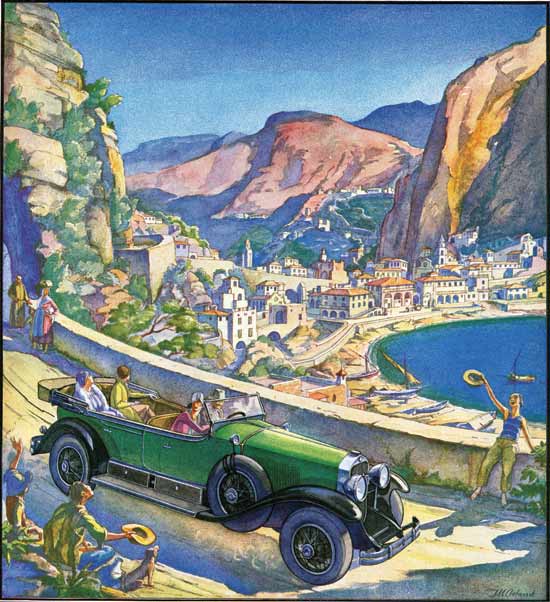
This article and other features about the early automobile can be found in the Post’s Special Collector’s Edition: Automobiles in America!
In this 1922 essay, the author points out that the vast changes underway to accommodate the automobile were about to vastly alter the character of towns across America, as was already happening in cities like New York and Chicago. But far from lamenting the coming changes, the writer describes them as essential to progress.
Tomorrow you may not know your own city. They have probably begun altering it already, or are planning to do so. Tomorrow your city will have wide boulevards cut through its narrow streets. These will accommodate four, six, and eight lines of traffic. They will start at the center and run miles out into the country. Thousands of buildings will be torn down. Sharp street corners will be rounded off and the circle and crescent take the place of the checkerboard.
Did your city fathers, years ago, lay out a downtown boulevard or two with a strip of parkway in the center? That beauty spot will be needed for traffic. Slums and tenements will disappear too. There will be a general grading up of living standards and an equalization of real-estate values.
When you drive a car the traffic cop will no longer be able to bawl you out, for he will disappear from street crossings, guiding traffic by electric signals from a point where he can see everything but say nothing — that is, if he doesn’t disappear altogether.
When you go for a walk it will be a far safer and more comfortable form of exercise than today, for the bulk of automobile traffic will either be transferred to elevated roads for automobiles alone, or disappear into tunnels. The trolley cars will disappear underground or be replaced by buses, which are not only more flexible than the trolley, dodging in and out of traffic, but are more flexible in routing.
Your city will be linked with others all over the state and country by great trunk motor highways, with lighted traffic signals, and perhaps traffic officers. Much of the motor travel between cities will be out of sight, on separate highways that do not enter the towns at all, but skirt them.
The automobile is at the bottom of all these changes. With the number of cars increasing to, in some cases, one for every two families, our cities have developed street traffic comparable with high blood pressure.
“Say, that thing’ll never be practical!” exclaimed a New Yorker when he first saw a horseless carriage. “Why, a man has to go ahead of it with a red flag!” Within five years he was driving an automobile himself. When horses and pedestrians became accustomed to the automobile, the man with the red flag was no longer necessary. But today he is again walking ahead, figuratively, as the traffic policeman. This is fundamentally wrong. “Speed limits on the automobile are a paradox,” says a New York trade-journal publisher. He writes: “The automobile is designed to run fast. That is its whole function, attraction, and service. Limit it, and you lose all its benefits. Speed limits and traffic control have become necessary because we have not yet learned to separate the automobile from slower traffic, and give it highways of its own.”
Few of our cities were really planned — for the most part they just happened — and even the best city plans of our fathers and grandfathers have been outgrown. The cowpath origin of city streets is familiar and amusing. People delight in its absurdities, getting lost in Boston’s old waterfront mazes, and verifying the fact that Pearl Street, in lower New York, crosses Broadway twice. A cowpath town was often most convenient for getting about, so long as everything was built within walking distance, allowing goods to be delivered by wheelbarrow. When it got larger, the cowpath section was extended on a checkerboard plan providing for growth, but usually with streets too narrow for present-day traffic, and with far too few parks and breathing places. If granddad was very farsighted he laid down a combination of checkerboard and turnpike, as in Washington and Indianapolis, the turnpikes radiating like the spokes of a wheel, providing lines of growth, and also highways by which farmers could bring in food from the surrounding country.
In general there are only these three kinds of towns, cowpath, checkerboard, and cartwheel. A cowpath town tends to congestion at the center rather than healthy growth at the radius, and makes dandy slums. The checkerboard town grows faster. The cartwheel town grows fastest of all, and most evenly and healthily.
Today we have better information than previous generations upon which to plan cities for the future. But we are dealing with city difficulties piecemeal. When traffic begins to tangle at a certain corner, we put a policeman at that corner to straighten traffic out. The tangle spreads up and down as traffic grows. We put more policemen on more corners, then lift them into towers and organize control in units of five or 10 blocks. But mere streets become impossible for handling all the traffic. Street cars, automobiles, motor trucks, horse vehicles, and pedestrians must be separated and given their own right-of-way where none can hamper or endanger the others.
—“Your Town Tomorrow,”
The Saturday Evening Post, April 1, 1922